- Home
- Carolyn Keene
The Clue of the Whistling Bagpipes Page 7
The Clue of the Whistling Bagpipes Read online
Page 7
“Yes, several colleges were started many centuries ago,” Fiona said. “The one at Borreraig trained the MacCrimmons, a clan of fine pipers for more than two hundred years!”
“It’s thrilling to think that the bagpipe we know today has such a long and colorful history,” Nancy remarked as she guided the small convertible along the neat, hedge-bordered roads.
“Oh, yes, and its history is not Scottish alone,” Fiona declared. “I understand the instrument first was played in Egypt as a simple chanter and drone. Later on, these were attached to a bag made of skin and fitted to a blowpipe.”
“Egypt!” Bess exclaimed, then giggled. “Can you imagine King Tut playing a bagpipe?”
Fiona laughed. “Perhaps you ought to imagine that Aristotle and Julius Caesar were pipers, too, for the Greeks and Romans played the bagpipe. Then the custom spread through Europe by the Celtic and Roman invasions.”
“If that’s true, why do we think of it as a Scottish instrument?” George asked.
Fiona explained. “The primitive instrument is still played in isolated spots of Europe. But in most places music became an indoor entertainment and people were interested in more subdued melodies and elaborate arrangements.”
“Dinner music,” George suggested, and Fiona nodded.
“But its history was different in the Scottish Highlands,” Fiona declared. “Our lusty people loved the martial spirit of the music of the pipes and used it for marching troops. It pepped them up when they were tired. Chiefs of the Highland clans were proud of their pipers.”
“George, I wish you hadn’t mentioned dinner music,” Bess declared. “I’m getting hungry!”
The girls laughed, and Fiona said that they were only a short distance from an attractive golf course and hotel where they could lunch.
All the girls had healthy appetites by the time they entered the large dining room. They were intrigued by a long, flower-decorated buffet table in the center of which stood the two-foot-high statue of a golfer carved in ice.
An hour later the girls took off once more. For several more miles the drive led through wooded hillsides as well as others covered with large patches of heather. In the pastureland cattle and sheep seemed to roam at will across the road and up and down the slopes. Presently Nancy reached a long, narrow body of water which Fiona told them was an arm of Loch Leven.
At the small village of Ballahulish, Fiona said, “We’ll take a ferry from here into Inverness-shire rather than drive the long way around the arm.”
Nancy’s car was the first to arrive at the landing. Shortly afterward, other vehicles came up and soon the ferryboat approached.
The Americans had never seen a craft like this one. It was small and flat, with a single deck. There was a tiny cabin for the pilot and his assistants at the stern. Fastened to the deck behind the cabin, and reaching to the bow of the ferry, was a turntable with stout steel raised gangplanks at either end.
Because of the strong tide, the ferry was moored alongside the pier. Slowly the turntable began to move until it was at right angles to the deck. The nearer gangplank was let down and the cars drove off. Then Nancy was waved aboard. Three cars followed and they were tightly packed in. Once more the turntable swung halfway around and the little vessel started its journey.
“Isn’t this divine!” Bess remarked as the refreshing wind whipped the girls’ hair.
The ride across the loch was short. When the ferry reached the opposite shore, the turntable swung around, the gangplank was lowered, and the guard motioned for Nancy to drive off. She found herself fairly close to the edge of the cobblestone roadway which led up from the water. There was no rail, and on either side below, a marshy growth of reeds protruded from the surface.
“Look out!” Bess cried out.
Nancy glanced in the mirror, just in time to see the man behind her put on a burst of speed. The red-bearded stranger! He was so close she could pull over only about six inches. The next moment he gave her car a hard shove. The steering wheel twisted in Nancy’s hands, and before she could do anything, the girls’ convertible shot off into space!
All its passengers were catapulted into the water except Nancy, who clung to the wheel and managed to stay in her seat. The car landed upright in about four feet of water.
Immediately there were shouts of alarm. Cars stopped and people jumped out to rush to the girls’ assistance. Completely soaked and muddy, Bess, George, and Fiona waded to shore. Nancy, wet to her waistline, stood up on the seat.
“I’ll help you, lass!” called a man.
Already he had removed his shoes and socks and rolled his trousers up above his knees. He jumped into the water and quickly reached Nancy.
She had recovered from her fright, but still felt a little shaky as she took his hand. “This is very kind of you, sir. Thank you. I wonder how we’ll get this car out.”
“Ye canna drive it out, that is certain!” the Scotsman said with a smile. “But it is not a heavy car. I will fetch a group of my friends and we can lift it ashore.”
“I appreciate your helpfulness,” said Nancy, “but I don’t want to put you to so much trouble. Isn’t there a wrecker that could do it?”
“Aye, and that there be,” the man replied. “If you like, I will get in touch with the owner.”
Meanwhile, the other girls were fuming over the accident. “The red-bearded man caused it!” Bess declared.
At that moment a woman walked onto the dock. She gave the three girls a motherly smile and introduced herself as Mrs. Drummond.
“I am so glad you are not hurt,” she said. “But I am sorry about your car. My croft home is not far from here—just beyond the mountain of Ben Nevis—and I live alone. It would be a pleasure if you lassies would stay with me until tomorrow morning. I am sure the car will not be in working condition before then.”
The girls returned the woman’s smile and thanked her. Bess added, “So far as I’m concerned, I’d love to come, but first we’ll have to ask our friend Nancy Drew—the poor girl out there.”
The other automobiles from the ferry had begun to move. George posted herself at the pier exit and stopped each driver to ask if he knew the man who had pushed Nancy off the roadway, or had noted his license number. Neither had. They had been so horrified at the accident they had not noticed. One man did say, however, that the fellow had driven off at once.
“How dumb of me not to have spotted him on the boat!” George chided herself.
By this time Nancy had been helped ashore. “I’m all right,” she assured her friends. Upon learning of Mrs. Drummond’s invitation, Nancy said, “We’ll be happy to accept your hospitality.”
The man who had assisted Nancy then brought the girls’ bags from the trunk. Fortunately the compartment was watertight, and the suitcases were only slightly damp. They were lifted up to the pier and several other men willingly carried them to shore.
Mrs. Drummond had been looking at Nancy intently. She now turned to Fiona and said something in Gaelic. Fiona smiled and told Nancy that Mrs. Drummond had asked if Nancy was the American girl detective whose picture she had seen.
Nancy laughed. “I’m surprised you recognized me in such a bedraggled condition!”
As soon as the waterlogged convertible had been towed away, Mrs. Drummond led the girls to her own car nearby. The luggage was stowed, and the five climbed in.
Mrs. Drummond’s croft proved to be that in name only. The original one-room building was now the living room of a house with many other rooms. All the quaintness of the original croft had been left—its large stone fireplace, with hanging crane and iron pot; the rustic wooden chairs; the wall bed, which was now an attractive built-in sofa; and even a baby’s cradle.
“Oh, this is absolutely charming!” Nancy exclaimed.
The girls were led to two bedrooms, each with a huge canopied bed and colorful hand-woven draperies and rugs. Nancy would room with Fiona.
By the time all four girls had bathed and were dressed,
Mrs. Drummond had a substantial supper ready. It started with cock-a-deckie soup of leeks and a boiling hen. Then came mutton stew, filled with potatoes and small white turnips. There was kale as a side dish, and for dessert a bowl of steamed bread pudding filled with currants and topped with custard sauce.
“That was a marvelous meal!” Bess declared. “I’m stuffed!”
“But you must have a treacle doddie!” Mrs. Drummond insisted, and brought out a jar of brown sticky candy balls. Bess and her friends could not resist, and found the sweets delicious.
The girls helped Mrs. Drummond clear away the supper dishes. Then there was conversation by a cozy fire and finally the visitors said good night. Tucked under the covers at the foot of their beds each girl found an enormous hot-water bottle, which Fiona said was called a pig.
“Mm! Feels wonderful!” Nancy thought as she cuddled, giggling, down among the covers.
She slept soundly until midnight, then was awakened suddenly by the sound of bagpipes. She realized the music was some distance away, but Nancy could hear it well enough to recognize the first phrase of Scots, Wha Hae!
“That’s funny—someone playing the pipes at this time of night—and not playing the tune very well.” Instantly her mind flew to Mr. Dewar and the bagpipe playing in his hotel room.
“I’m going to find out what’s going on,” Nancy decided as the phrase was repeated.
She dressed quickly, tiptoed from the room, and went outside. There was a full moon, and though heavy mist lay over the landscape, Nancy was sure the music had come from a hill in the distance.
She decided to sit down on a bench near the doorway of the croft and listen. Just then she heard a truck speeding along the road toward the house. As the big closed vehicle passed by, Nancy was aware of a plaintive bleat from within, like that of a lamb.
Lambs! Sheep! Trucks! The story Ned had told Nancy of the stealing of sheep in the Highlands of Scotland flashed into the young sleuth’s mind.
Could this truck, by any chance, belong to one of the gang?
CHAPTER XII
Strange Midnight Whistle
NANCY ran forward and strained her eyes to catch the license number and make of the mysterious truck. But just then two swiftly running figures dashed up, obscuring her view.
Bess and George!
“Nancy, you scared us silly!” Bess complained. “We heard you leave your room and not come back. Why are you out here?”
The young sleuth quickly explained.
“Stolen sheep!” George exclaimed.
Just as she spoke, the girls heard a whistling sound in the distance. With intermittent stops, it continued for nearly a minute.
“What in the world is that?” Bess queried.
Nancy said she thought it was being made on bagpipes.
“I didn’t know you could whistle on bagpipes,” said Bess.
“I suppose you’re going to tell us it’s some kind of a signal!” George guessed.
“I wish I knew,” Nancy said thoughtfully, and led the way back into the house.
Neither Mrs. Drummond nor Fiona had awakened, so it was not until morning that Nancy could tell about the playing of the bagpipes and the truck with a bleating lamb inside. At once Fiona said that the reed for a chanter could be split to make any kind of sound one wished. “But I don’t see why anyone would want to go to the trouble of having it whistle.”
Nancy did not reply but felt that there might indeed be a very good reason. If it were a sinister one, she certainly hoped to find out what it was!
Mrs. Drummond was very much concerned about the possibility of the truck having contained stolen sheep. She hurried to the telephone and called several of her neighbors to report her suspicions. When she rejoined the girls, the woman said:
“Shepherds will go out at once with their dogs to make an investigation. Perhaps you girls would like to hike around to watch.”
“Indeed we would!” said Nancy. “And do you think we should notify the police?”
Mrs. Drummond said she supposed so, but added, “You know, thieves, like lightning, rarely strike in the same place twice. Besides, since we have no good description of the truck, there isn’t much for the authorities to go on.”
George added, “Nancy, you heard only one bleating lamb. Maybe there weren’t any others inside.” Nancy agreed, admitting they had no real evidence.
As soon as breakfast was over, Mrs. Drummond told the girls which direction to take to watch the shepherds and their dogs. After hiking to a hillside, they saw a shepherd dressed in clothes much like a hunter’s, working with a black-and-white collie. It was rounding up sheep and bringing them to the man’s side. Fiona said this was called shedding.
The Americans found it particularly fascinating to watch the strays, especially those with baby lambs. Once, an argumentative ewe was trying to keep her lamb from obeying the dog. She and her baby were pure white except for their black noses and feet. The girls laughed as the dog won out and succeeded in leading mother and daughter to the shepherd.
Bess, noticing a small daub of red paint just in front of the sheeps’ tails, asked Fiona what this was for.
“It identifies the flock, which wanders all over,” the Scottish girl replied. “Another farmer will use blue.”
They talked for a few minutes with the shepherd, who said his dog was one of the best in the country. “He has won prizes in contests of cutting out sheep. Would you like to see him do it?” the man asked.
“Oh, yes!” the girls chorused.
He asked them to stand off at a little distance. As the collie waited, the shepherd went into the center of the assembled flock and laid his hand on the head of one of the sheep. Then he walked back to where the girls were standing.
“Trixie,” he said to the dog, “bring me that sheep! ”
The dog was off at once. He wound his way in and out among the animals, pushing softly at various ones and nosing at the legs of a few, to make a path for the designated sheep to get out. Now he worried the chosen ewe, which gamboled quickly to the man’s side. The whole procedure had taken less than a minute!
“That’s marvelous!” Nancy exclaimed.
As she stood admiring the ewe, she suddenly felt a tug on her jacket and looked down to find that the sheep had a button in its mouth! Nancy laughed and extricated it.
The shepherd grinned. “There’s almost nothing a sheep won’t try the taste of.”
The girls thanked him for the demonstration, then hurried back to the Drummond croft. They learned from their hostess that during the night a large number of sheep had disappeared from one of the nearby farms.
“A large number?” Bess asked. “Could very many stand up in that truck you saw, Nancy?”
The young detective had a theory. “It’s my guess they weren’t standing up. The thieves put them to sleep, but one lamb had revived by the time I heard it. The unconscious sheep, no doubt, were piled in that truck!”
“How cruel!” Bess cried out.
Mrs. Drummond smiled ruefully. “Thieves are never kind, gentle people,” she remarked. “But your idea is a good one, Nancy. Perhaps we should report it to the police.”
“They might think my idea farfetched,” said Nancy. “Let’s wait until I have some concrete evidence.”
At that moment the telephone rang, and after answering it, Mrs. Drummond told Nancy that her car was ready. “I’d like you girls to stay for a while, though. I’m enjoying your company. But when you’re ready to go, I’ll drive you to the garage.”
“Thank you,” said Nancy. “I think as soon as we help you tidy the house, we had better be on our way.”
As the girls were about to leave, Nancy found to her embarrassment that Mrs. Drummond would not take a farthing from her guests. This proved to be the case also with the garageman. He insisted that Nancy’s being pushed into the water was bad enough treatment for the visitors, and the least the natives could do for the girls was to speed them on their way without charge.
Nancy was about to insist on some kind of reimbursement when Fiona touched her arm and whispered, “Please do not say any more. These people will be offended.”
Mrs. Drummond gave Nancy a little farewell squeeze and said, “If you can solve the mystery of the stolen sheep, that will be wonderful pay for all of us.”
The girls climbed into the sports car, now clean and shiny, and took the road to Fort William. When they reached the attractive town with its colorful waterfront and many historic points of interest, they went sightseeing, then had luncheon at a hotel.
Afterward, Fiona took them to a museum. The girls found the quaint objects on display interesting, but what fascinated them most was a unique kind of portrait.
On a table lay a small, circular oil painting which looked like nothing else but daubs in various colors. At the center of the picture stood a cylindrical mirrored tube. When the girls looked into it, they could see the reflection of a handsome young man in Georgian clothes.
“He is our famous Bonnie Prince Charlie,” Fiona explained, “grandson of King James II, and son of the Old Pretender, who lived in exile in France. In 1745 the young Charles returned to Scotland and gathered the Highlanders under his banner. He was badly defeated at the Battle of Culloden Moor and hid out in the glens and hills.
“There were still many people in Scotland who would have liked him to win. One of these was a woman named Flora MacDonald. She had the prince disguise himself in her maid’s clothes, which enabled him to escape and return to France.”
“How romantic!” Bess murmured. “And oh, isn’t he handsome!”
Fiona giggled. “Yes, but history tells us he did not marry until he was fifty-two.”
“Better late than never,” Bess said dreamily.
As the girls walked from the building, Fiona said that since the Americans were now going to Douglas House, she felt she should say good-by and go on to the Isle of Skye. Instantly Nancy, Bess, and George urged her not to leave them.

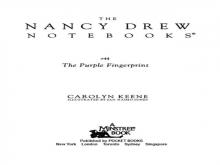 The Purple Fingerprint
The Purple Fingerprint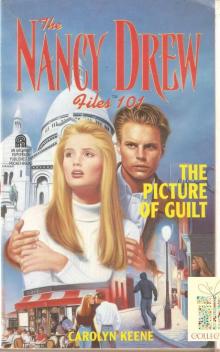 The Picture of Guilt
The Picture of Guilt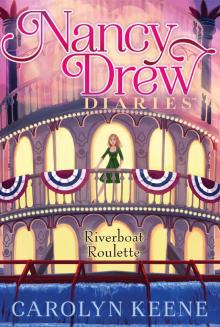 Riverboat Roulette
Riverboat Roulette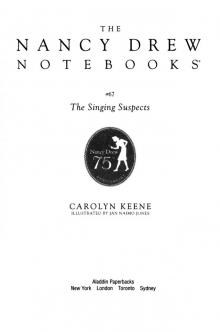 The Singing Suspects
The Singing Suspects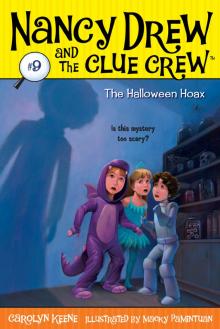 The Halloween Hoax
The Halloween Hoax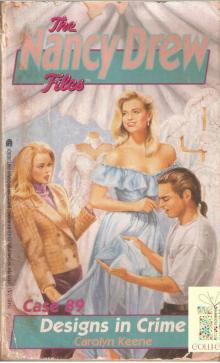 089 Designs in Crime
089 Designs in Crime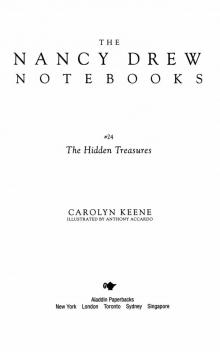 The Hidden Treasures
The Hidden Treasures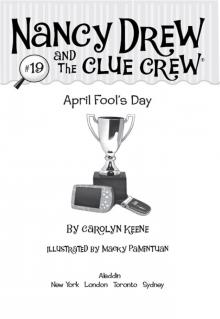 April Fool's Day
April Fool's Day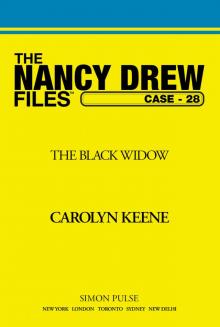 The Black Widow
The Black Widow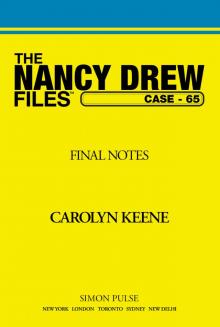 Final Notes
Final Notes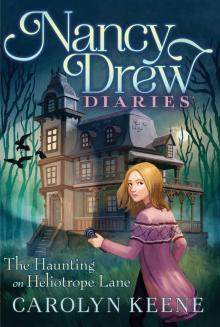 The Haunting on Heliotrope Lane
The Haunting on Heliotrope Lane The Runaway Bride
The Runaway Bride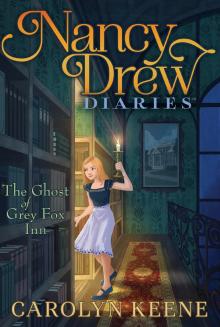 The Ghost of Grey Fox Inn
The Ghost of Grey Fox Inn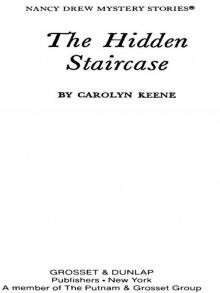 The Hidden Staircase
The Hidden Staircase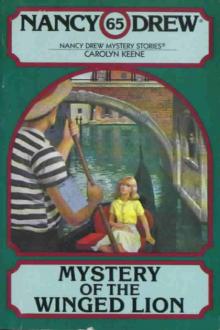 Mystery of the Winged Lion
Mystery of the Winged Lion Over the Edge
Over the Edge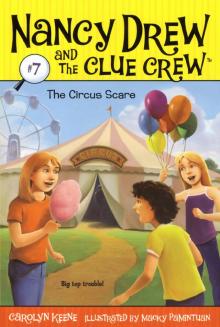 The Circus Scare
The Circus Scare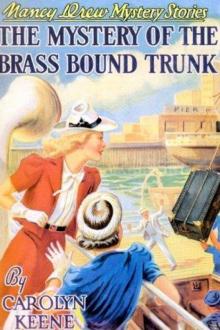 The Mystery of the Brass-Bound Trunk
The Mystery of the Brass-Bound Trunk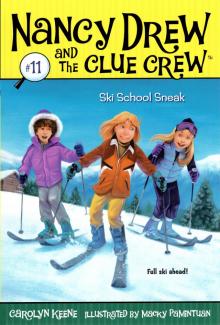 Ski School Sneak
Ski School Sneak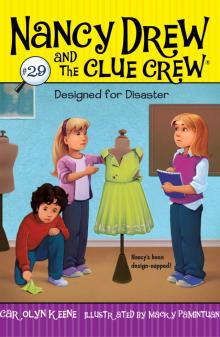 Designed for Disaster
Designed for Disaster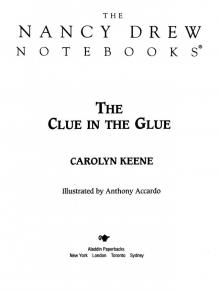 The Clue in the Glue
The Clue in the Glue Cold as Ice
Cold as Ice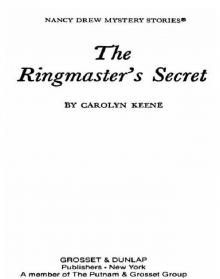 The Ringmaster's Secret
The Ringmaster's Secret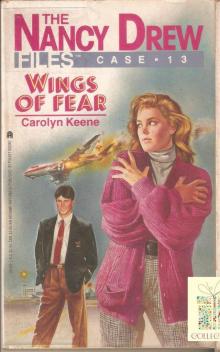 013 Wings of Fear
013 Wings of Fear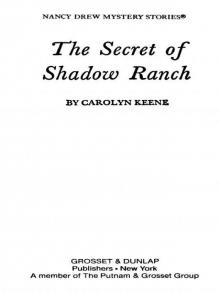 The Secret of Shadow Ranch
The Secret of Shadow Ranch Not Nice on Ice
Not Nice on Ice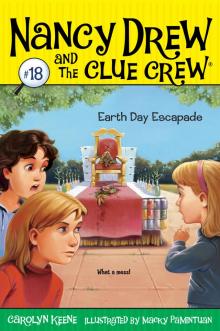 Earth Day Escapade
Earth Day Escapade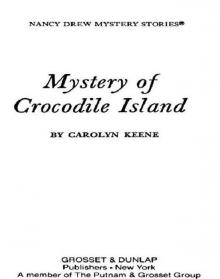 Mystery of Crocodile Island
Mystery of Crocodile Island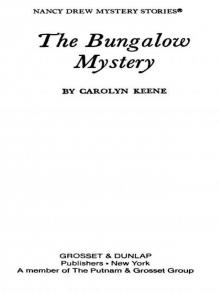 The Bungalow Mystery
The Bungalow Mystery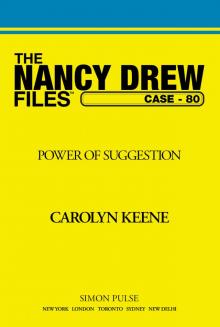 Power of Suggestion
Power of Suggestion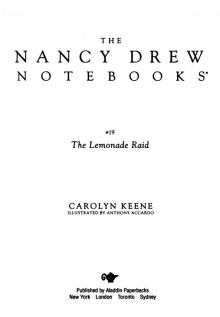 The Lemonade Raid
The Lemonade Raid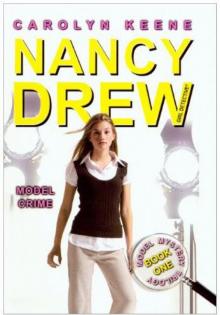 Model Crime
Model Crime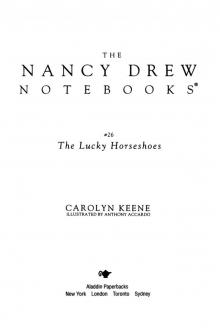 The Lucky Horseshoes
The Lucky Horseshoes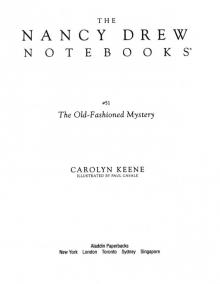 The Secret of the Old Clock
The Secret of the Old Clock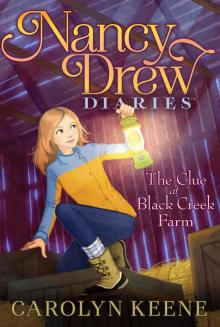 The Clue at Black Creek Farm
The Clue at Black Creek Farm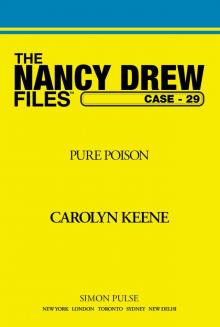 Pure Poison
Pure Poison Nobody's Business
Nobody's Business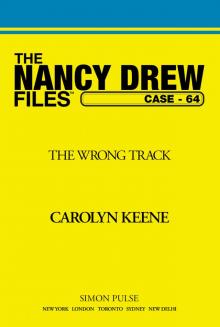 Wrong Track
Wrong Track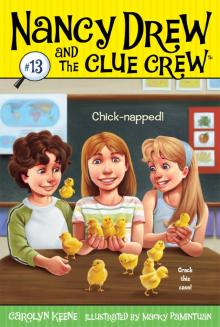 Chick-Napped!
Chick-Napped!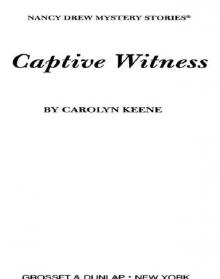 Captive Witness
Captive Witness If Looks Could Kill
If Looks Could Kill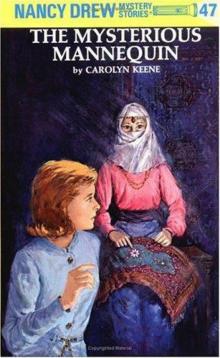 The Mysterious Mannequin
The Mysterious Mannequin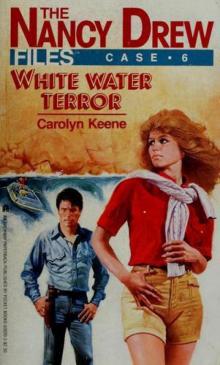 White Water Terror
White Water Terror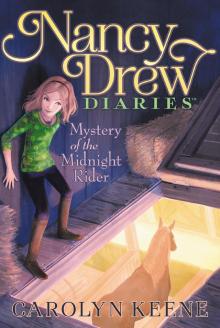 Mystery of the Midnight Rider
Mystery of the Midnight Rider Space Case
Space Case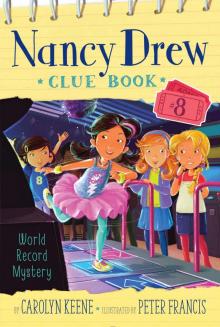 World Record Mystery
World Record Mystery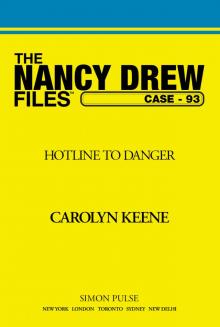 Hotline to Danger
Hotline to Danger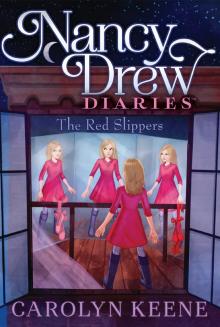 The Red Slippers
The Red Slippers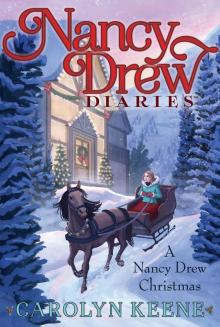 A Crime for Christmas
A Crime for Christmas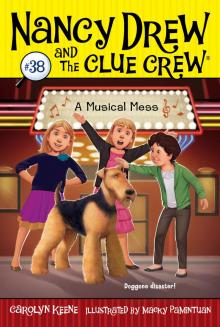 A Musical Mess
A Musical Mess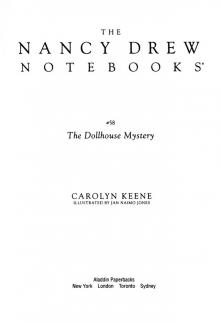 The Dollhouse Mystery
The Dollhouse Mystery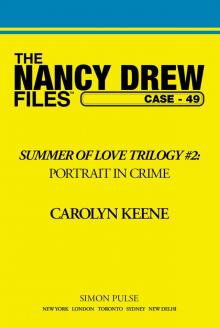 Portrait in Crime
Portrait in Crime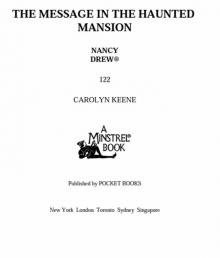 The Message in the Haunted Mansion
The Message in the Haunted Mansion Playing With Fire
Playing With Fire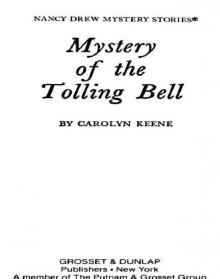 Mystery of the Tolling Bell
Mystery of the Tolling Bell Cutting Edge
Cutting Edge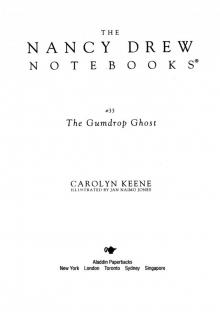 The Gumdrop Ghost
The Gumdrop Ghost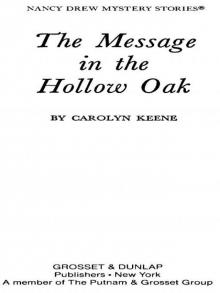 The Message in the Hollow Oak
The Message in the Hollow Oak Trial by Fire
Trial by Fire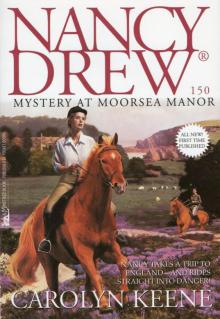 Mystery at Moorsea Manor
Mystery at Moorsea Manor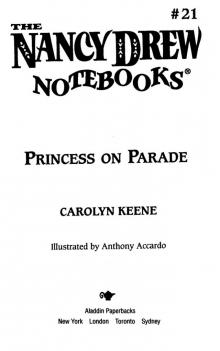 Princess on Parade
Princess on Parade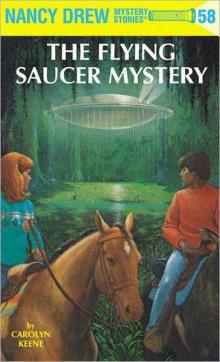 The Flying Saucer Mystery
The Flying Saucer Mystery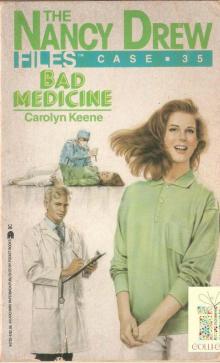 035 Bad Medicine
035 Bad Medicine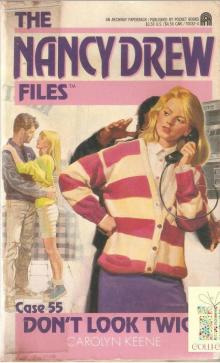 055 Don't Look Twice
055 Don't Look Twice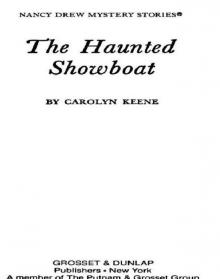 The Haunted Showboat
The Haunted Showboat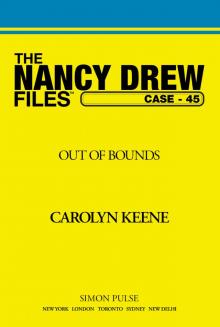 Out of Bounds
Out of Bounds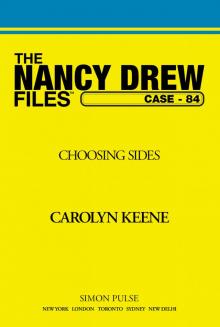 Choosing Sides
Choosing Sides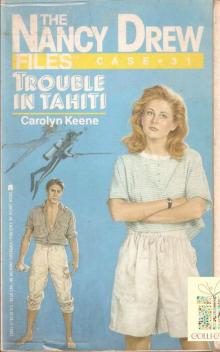 031 Trouble in Tahiti
031 Trouble in Tahiti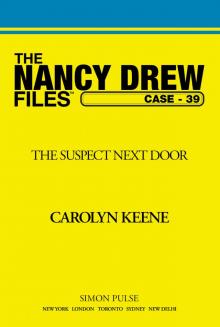 The Suspect Next Door
The Suspect Next Door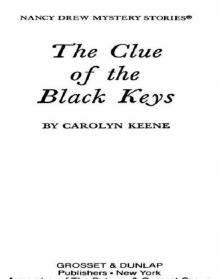 The Clue of the Black Keys
The Clue of the Black Keys The Secret Santa
The Secret Santa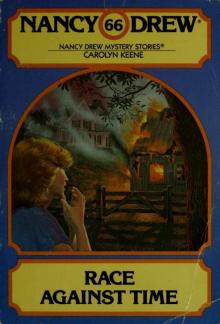 Race Against Time
Race Against Time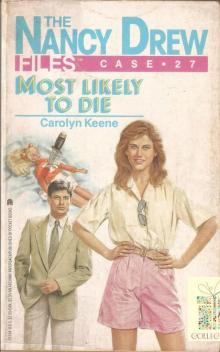 027 Most Likely to Die
027 Most Likely to Die The Cheating Heart
The Cheating Heart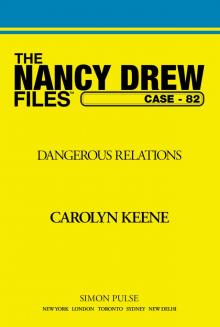 Dangerous Relations
Dangerous Relations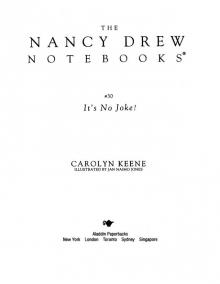 It's No Joke!
It's No Joke!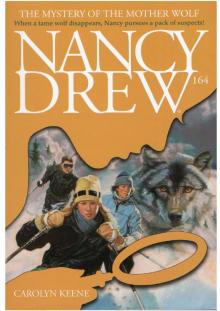 The Mystery of the Mother Wolf
The Mystery of the Mother Wolf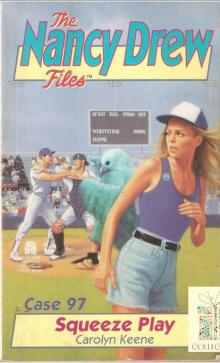 097 Squeeze Play
097 Squeeze Play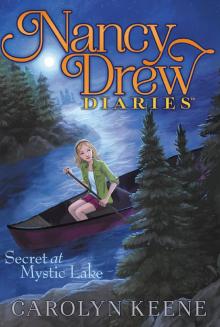 Secret at Mystic Lake
Secret at Mystic Lake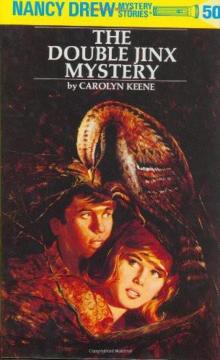 The Double Jinx Mystery
The Double Jinx Mystery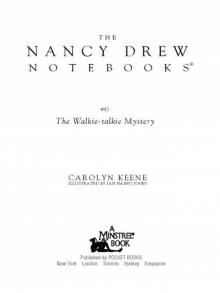 The Walkie Talkie Mystery
The Walkie Talkie Mystery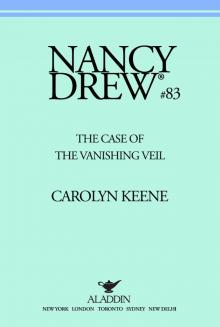 The Case of the Vanishing Veil
The Case of the Vanishing Veil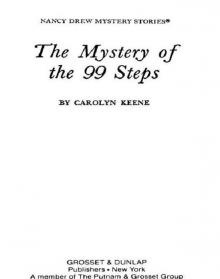 The Mystery of the 99 Steps
The Mystery of the 99 Steps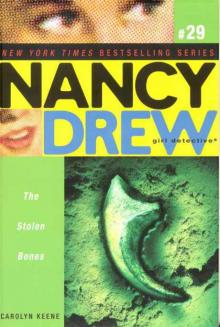 The Stolen Bones
The Stolen Bones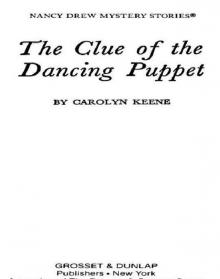 The Clue of the Dancing Puppet
The Clue of the Dancing Puppet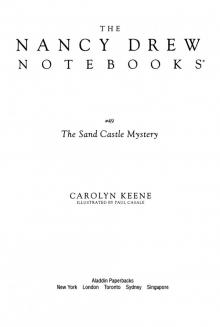 The Sand Castle Mystery
The Sand Castle Mystery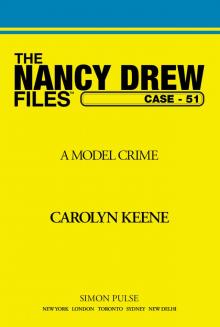 A Model Crime
A Model Crime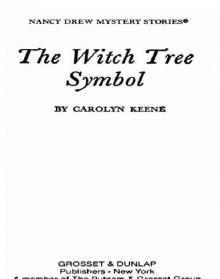 The Witch Tree Symbol
The Witch Tree Symbol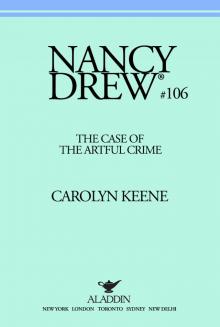 The Case of the Artful Crime
The Case of the Artful Crime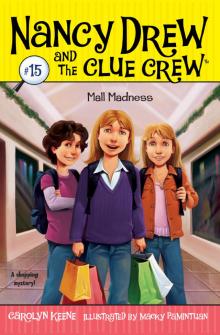 Mall Madness
Mall Madness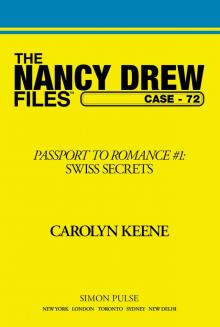 Swiss Secrets
Swiss Secrets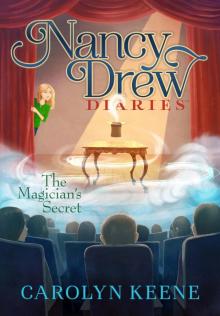 The Magician's Secret
The Magician's Secret Tall, Dark and Deadly
Tall, Dark and Deadly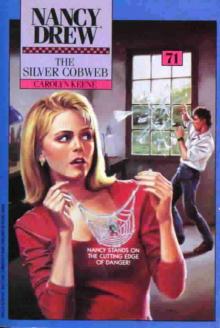 The Silver Cobweb
The Silver Cobweb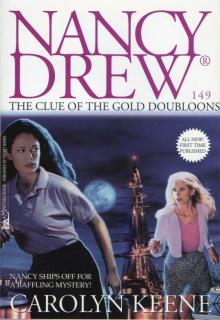 The Clue of the Gold Doubloons
The Clue of the Gold Doubloons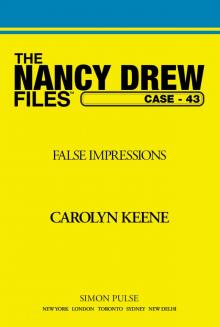 False Impressions
False Impressions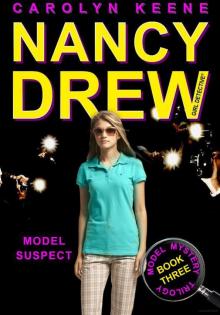 Model Suspect
Model Suspect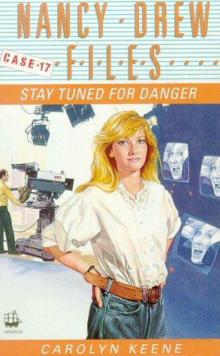 Stay Tuned for Danger
Stay Tuned for Danger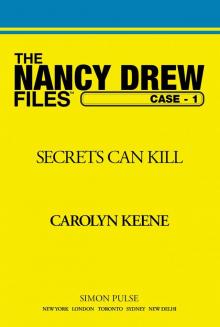 Secrets Can Kill
Secrets Can Kill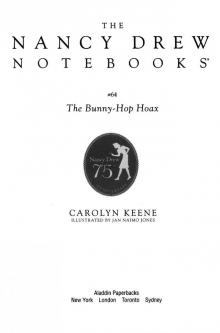 The Bunny-Hop Hoax
The Bunny-Hop Hoax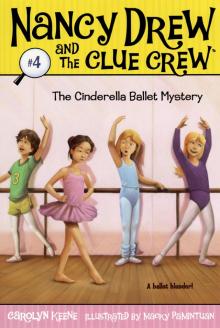 The Cinderella Ballet Mystery
The Cinderella Ballet Mystery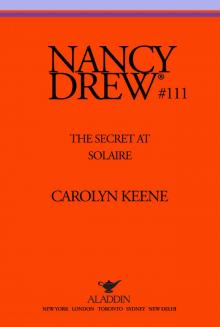 The Secret at Solaire
The Secret at Solaire Trash or Treasure?
Trash or Treasure?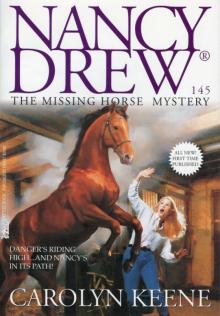 The Missing Horse Mystery
The Missing Horse Mystery The Lost Locket
The Lost Locket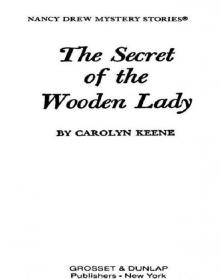 The Secret of the Wooden Lady
The Secret of the Wooden Lady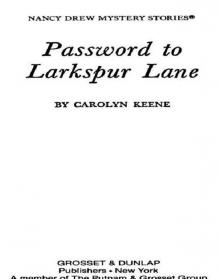 Password to Larkspur Lane
Password to Larkspur Lane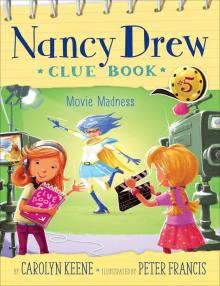 Movie Madness
Movie Madness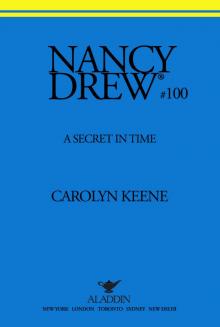 A Secret in Time
A Secret in Time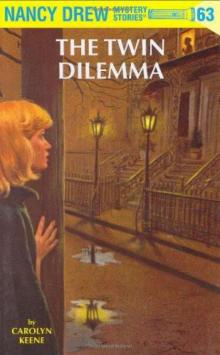 The Twin Dilemma
The Twin Dilemma Candy Is Dandy
Candy Is Dandy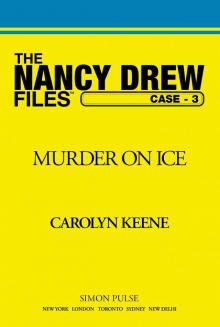 Murder on Ice
Murder on Ice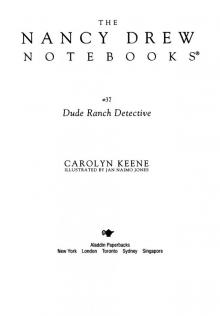 Dude Ranch Detective
Dude Ranch Detective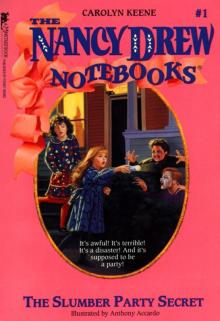 The Slumber Party Secret
The Slumber Party Secret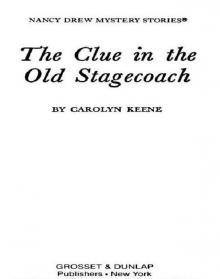 The Clue in the Old Stagecoach
The Clue in the Old Stagecoach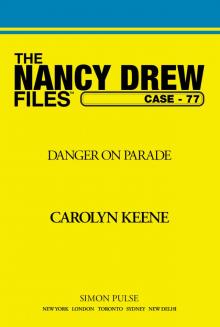 Danger on Parade
Danger on Parade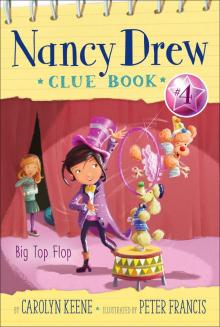 Big Top Flop
Big Top Flop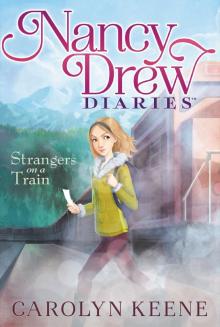 Strangers on a Train
Strangers on a Train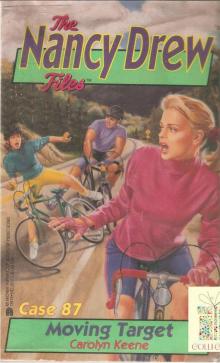 087 Moving Target
087 Moving Target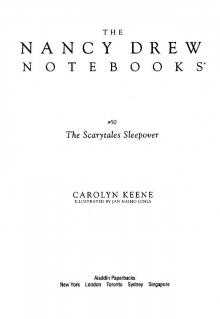 The Scarytales Sleepover
The Scarytales Sleepover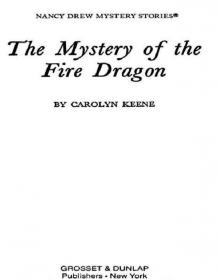 The Mystery of the Fire Dragon
The Mystery of the Fire Dragon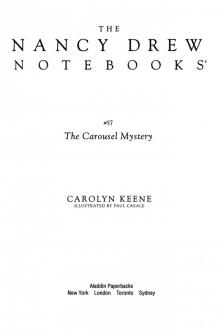 The Carousel Mystery
The Carousel Mystery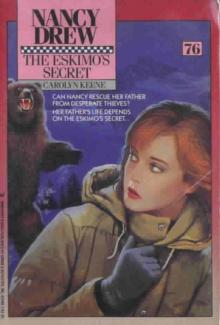 The Eskimo's Secret
The Eskimo's Secret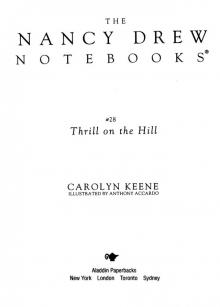 Thrill on the Hill
Thrill on the Hill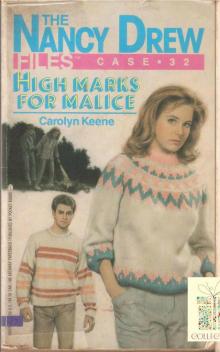 032 High Marks for Malice
032 High Marks for Malice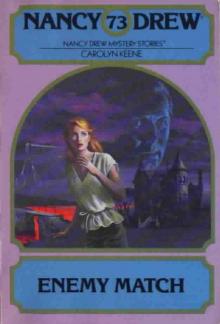 Enemy Match
Enemy Match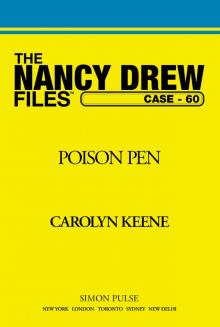 Poison Pen
Poison Pen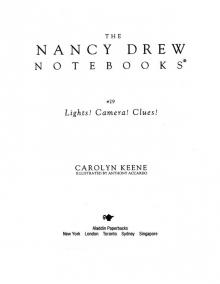 Lights, Camera . . . Cats!
Lights, Camera . . . Cats!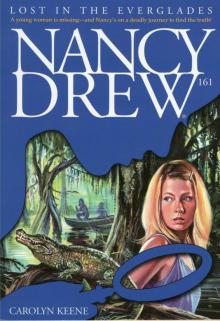 Lost in the Everglades
Lost in the Everglades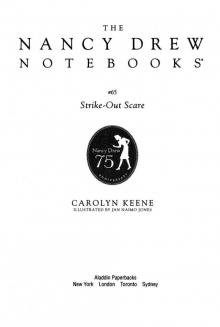 Strike-Out Scare
Strike-Out Scare Third-Grade Reporter
Third-Grade Reporter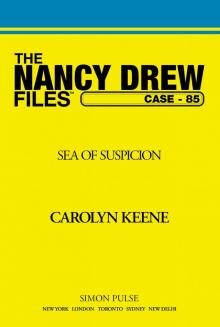 Sea of Suspicion
Sea of Suspicion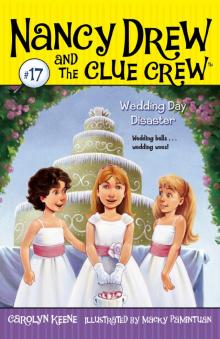 Wedding Day Disaster
Wedding Day Disaster The Make-A-Pet Mystery
The Make-A-Pet Mystery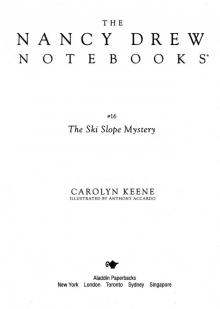 The Ski Slope Mystery
The Ski Slope Mystery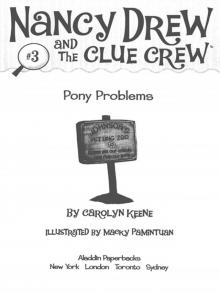 Pony Problems
Pony Problems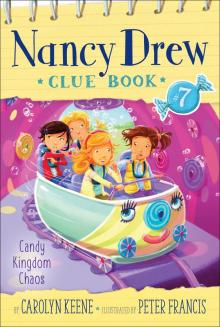 Candy Kingdom Chaos
Candy Kingdom Chaos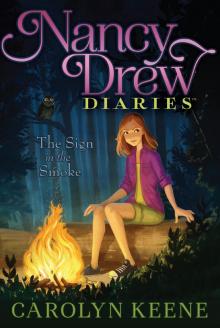 The Sign in the Smoke
The Sign in the Smoke The Wrong Chemistry
The Wrong Chemistry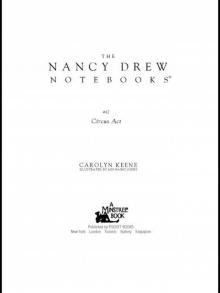 Circus Act
Circus Act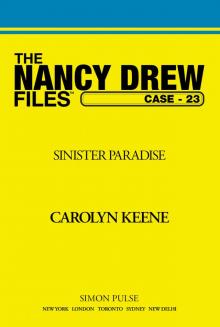 Sinister Paradise
Sinister Paradise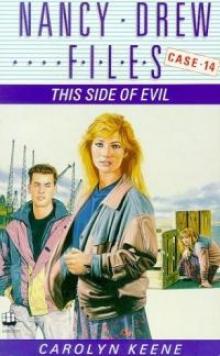 This Side of Evil
This Side of Evil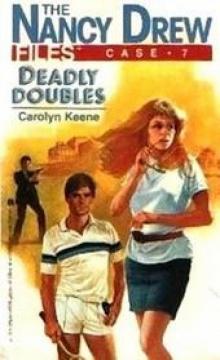 Deadly Doubles
Deadly Doubles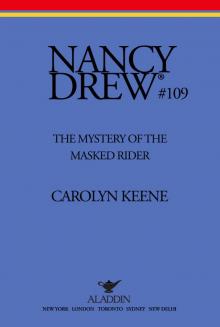 The Mystery of the Masked Rider
The Mystery of the Masked Rider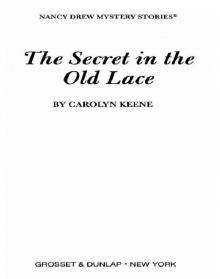 The Secret in the Old Lace
The Secret in the Old Lace The Pen Pal Puzzle
The Pen Pal Puzzle Without a Trace
Without a Trace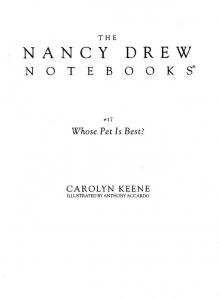 Whose Pet Is Best?
Whose Pet Is Best?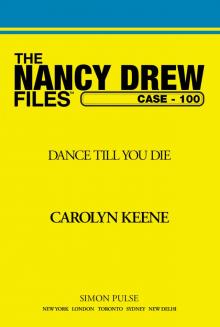 Dance Till You Die
Dance Till You Die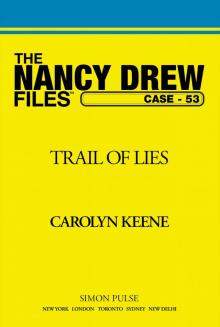 Trail of Lies
Trail of Lies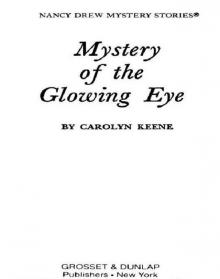 Mystery of the Glowing Eye
Mystery of the Glowing Eye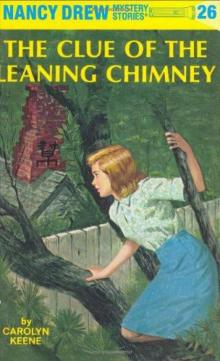 The Clue of the Leaning Chimney
The Clue of the Leaning Chimney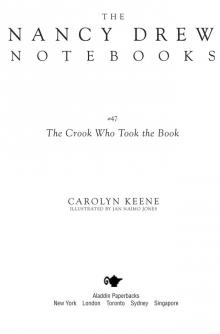 The Crook Who Took the Book
The Crook Who Took the Book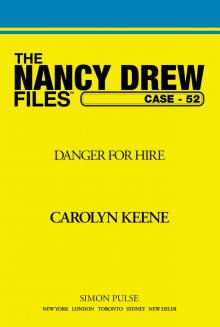 Danger for Hire
Danger for Hire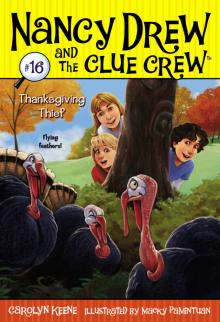 Thanksgiving Thief
Thanksgiving Thief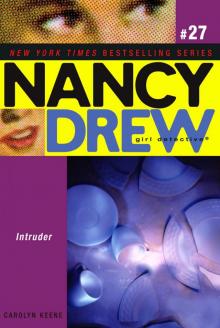 Intruder!
Intruder!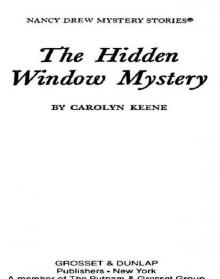 The Hidden Window Mystery
The Hidden Window Mystery Win, Place or Die
Win, Place or Die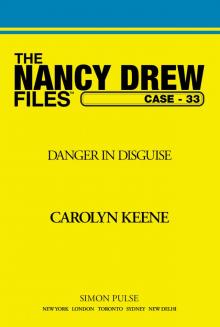 Danger in Disguise
Danger in Disguise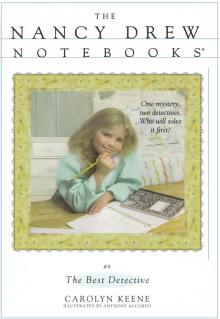 The Best Detective
The Best Detective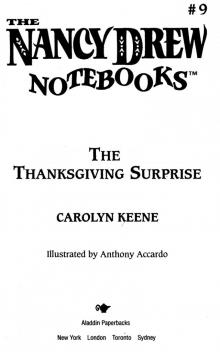 The Thanksgiving Surprise
The Thanksgiving Surprise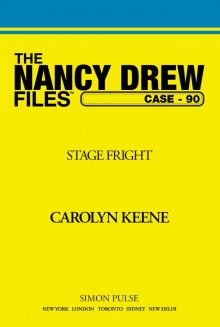 Stage Fright
Stage Fright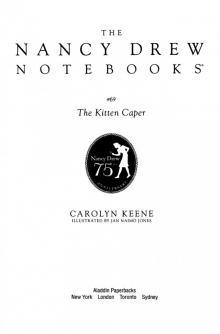 The Kitten Caper
The Kitten Caper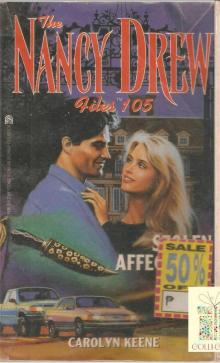 Stolen Affections
Stolen Affections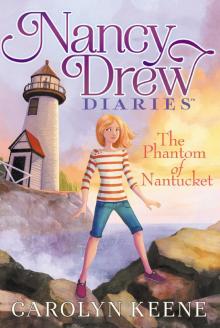 The Phantom of Nantucket
The Phantom of Nantucket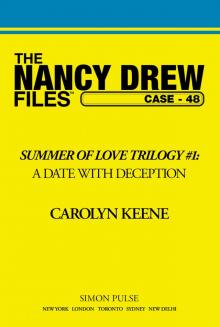 Date With Deception
Date With Deception Cooking Camp Disaster
Cooking Camp Disaster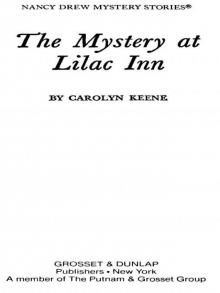 The Mystery at Lilac Inn
The Mystery at Lilac Inn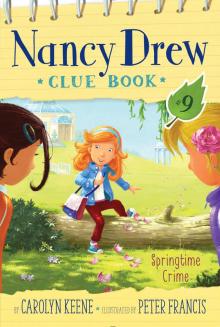 Springtime Crime
Springtime Crime Action!
Action! Into Thin Air
Into Thin Air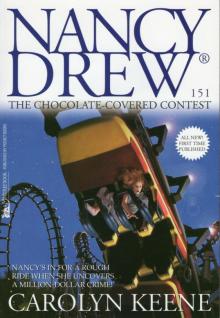 The Chocolate-Covered Contest
The Chocolate-Covered Contest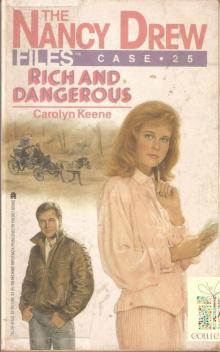 025 Rich and Dangerous
025 Rich and Dangerous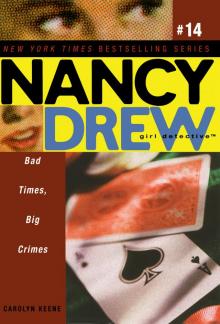 Bad Times, Big Crimes
Bad Times, Big Crimes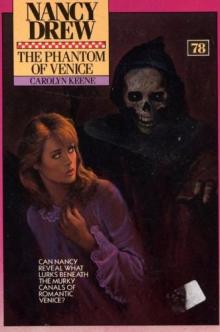 078 The Phantom Of Venice
078 The Phantom Of Venice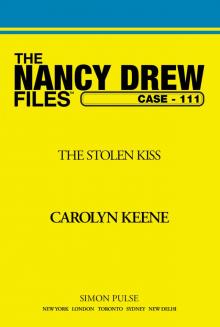 The Stolen Kiss
The Stolen Kiss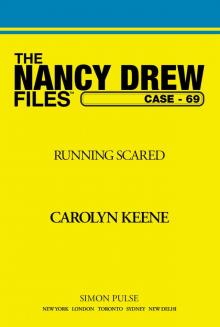 Running Scared
Running Scared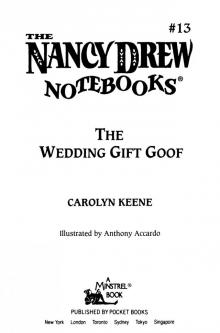 The Wedding Gift Goof
The Wedding Gift Goof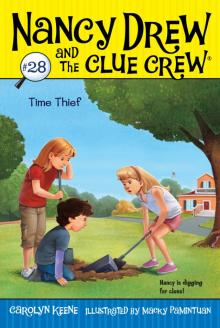 Time Thief
Time Thief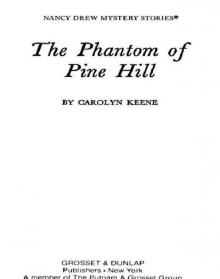 The Phantom of Pine Hill
The Phantom of Pine Hill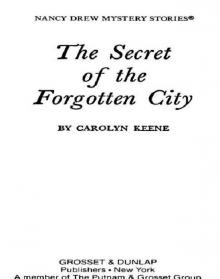 The Secret of the Forgotten City
The Secret of the Forgotten City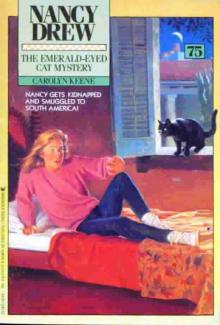 The Emerald-Eyed Cat Mystery
The Emerald-Eyed Cat Mystery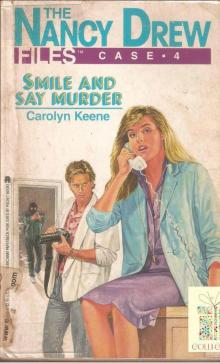 004 Smile and Say Murder
004 Smile and Say Murder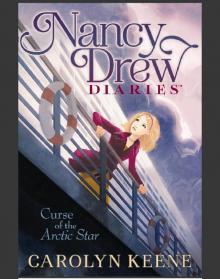 Curse of the Arctic Star
Curse of the Arctic Star Dinosaur Alert!
Dinosaur Alert!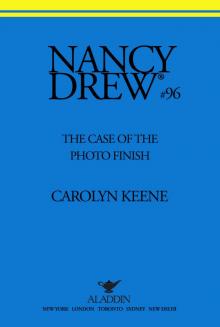 The Case of the Photo Finish
The Case of the Photo Finish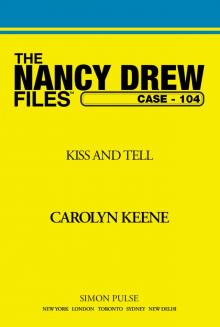 Kiss and Tell
Kiss and Tell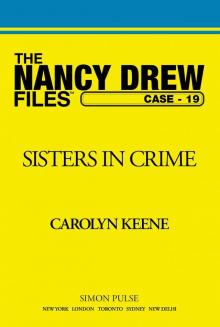 Sisters in Crime
Sisters in Crime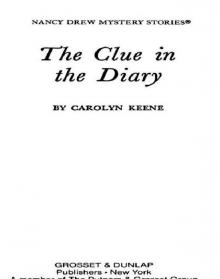 The Clue in the Diary
The Clue in the Diary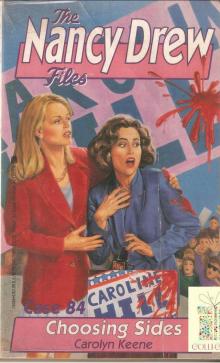 084 Choosing Sides
084 Choosing Sides Haunting of Horse Island
Haunting of Horse Island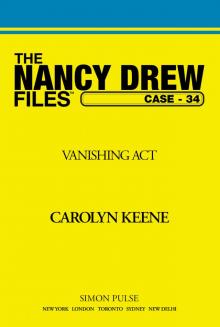 Vanishing Act
Vanishing Act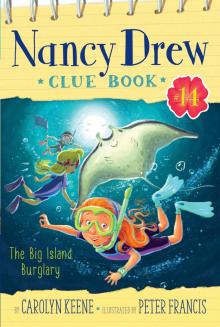 The Big Island Burglary
The Big Island Burglary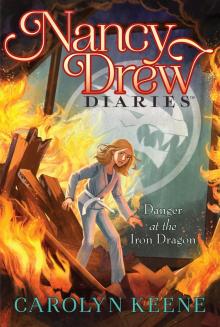 Danger at the Iron Dragon
Danger at the Iron Dragon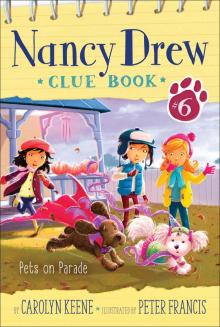 Pets on Parade
Pets on Parade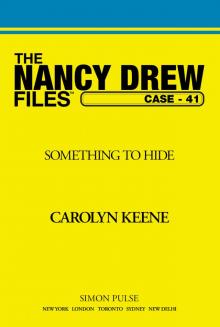 Something to Hide
Something to Hide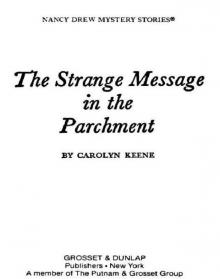 The Strange Message in the Parchment
The Strange Message in the Parchment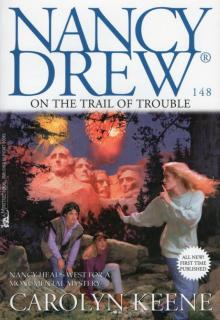 On the Trail of Trouble
On the Trail of Trouble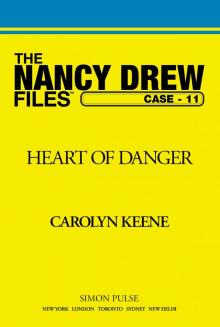 Heart of Danger
Heart of Danger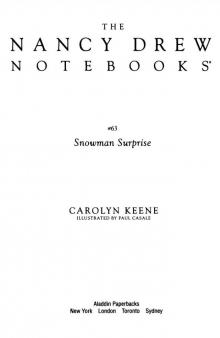 The Snowman Surprise
The Snowman Surprise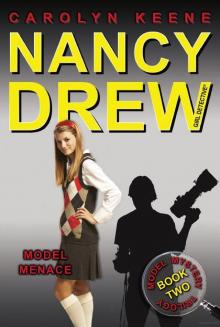 Model Menace
Model Menace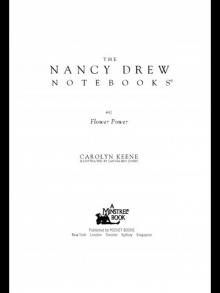 Flower Power
Flower Power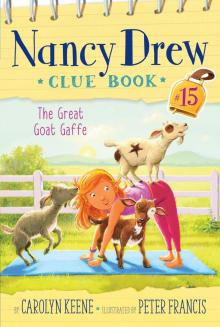 The Great Goat Gaffe
The Great Goat Gaffe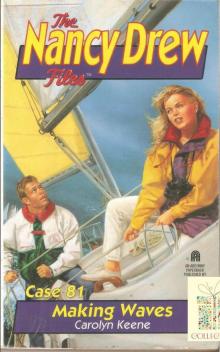 081 Making Waves
081 Making Waves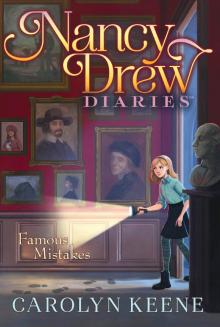 Famous Mistakes
Famous Mistakes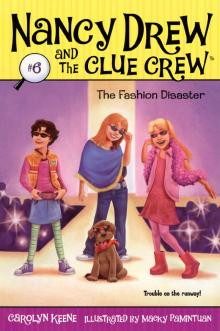 The Fashion Disaster
The Fashion Disaster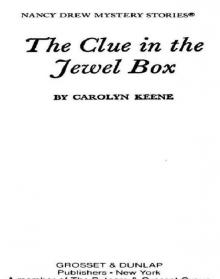 The Clue in the Jewel Box
The Clue in the Jewel Box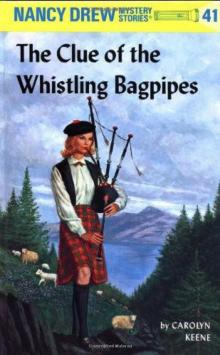 The Clue of the Whistling Bagpipes
The Clue of the Whistling Bagpipes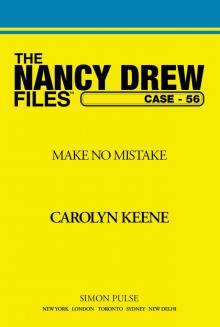 Make No Mistake
Make No Mistake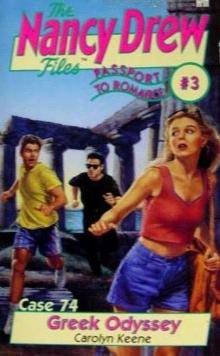 Greek Odyssey
Greek Odyssey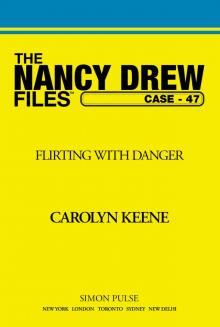 Flirting With Danger
Flirting With Danger Double Take
Double Take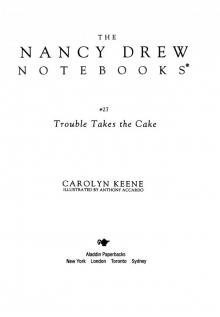 Trouble Takes the Cake
Trouble Takes the Cake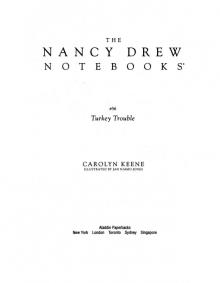 Turkey Trouble
Turkey Trouble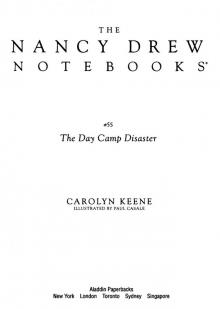 The Day Camp Disaster
The Day Camp Disaster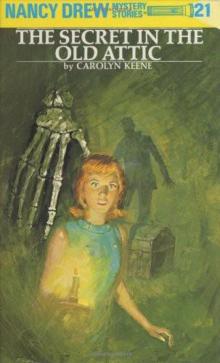 The Secret in the Old Attic
The Secret in the Old Attic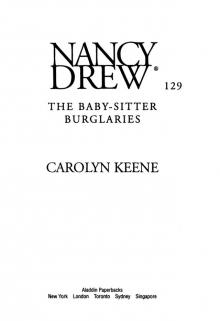 The Baby-Sitter Burglaries
The Baby-Sitter Burglaries Recipe for Murder
Recipe for Murder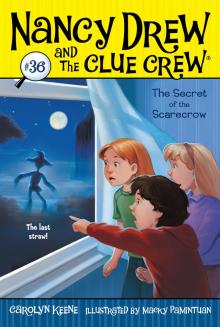 The Secret of the Scarecrow
The Secret of the Scarecrow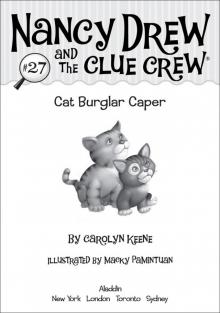 Cat Burglar Caper
Cat Burglar Caper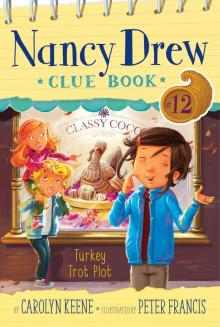 Turkey Trot Plot
Turkey Trot Plot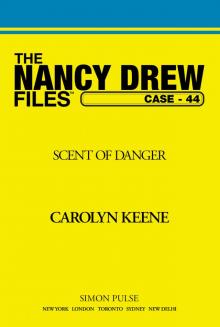 Scent of Danger
Scent of Danger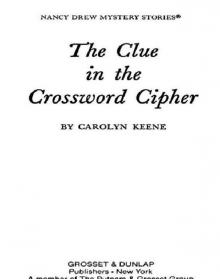 The Clue in the Crossword Cipher
The Clue in the Crossword Cipher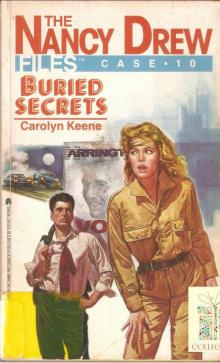 010 Buried Secrets
010 Buried Secrets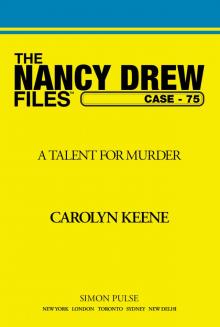 A Talent for Murder
A Talent for Murder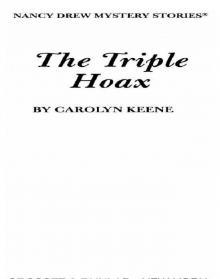 The Triple Hoax
The Triple Hoax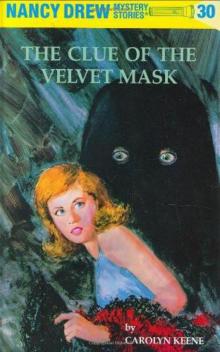 The Clue of the Velvet Mask
The Clue of the Velvet Mask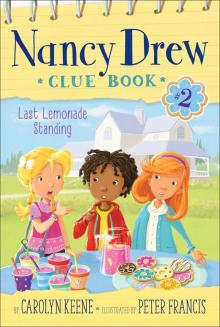 Last Lemonade Standing
Last Lemonade Standing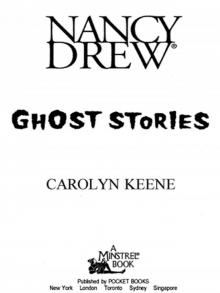 The Ghost of Blackwood Hall
The Ghost of Blackwood Hall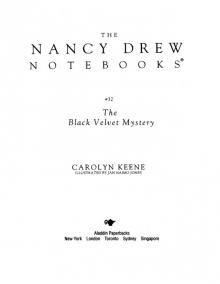 The Black Velvet Mystery
The Black Velvet Mystery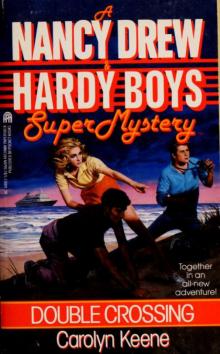 Double Crossing
Double Crossing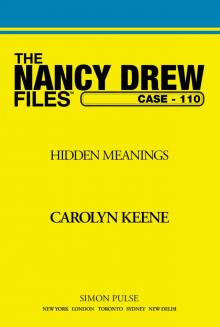 Hidden Meanings
Hidden Meanings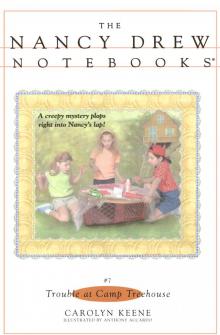 Trouble at Camp Treehouse
Trouble at Camp Treehouse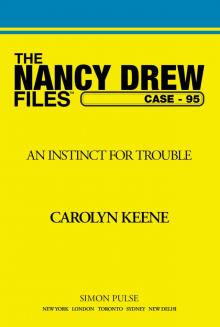 An Instinct for Trouble
An Instinct for Trouble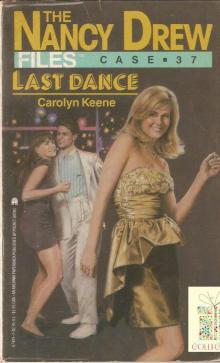 037 Last Dance
037 Last Dance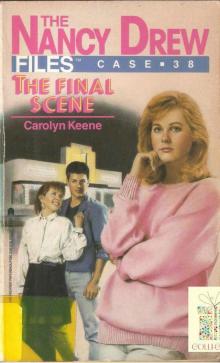 038 The Final Scene
038 The Final Scene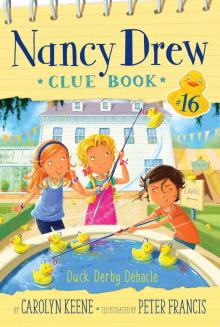 Duck Derby Debacle
Duck Derby Debacle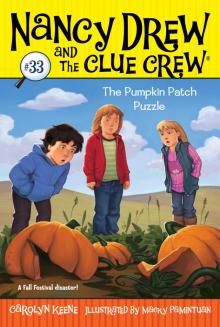 The Pumpkin Patch Puzzle
The Pumpkin Patch Puzzle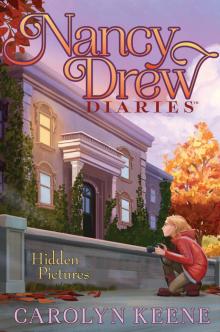 Hidden Pictures
Hidden Pictures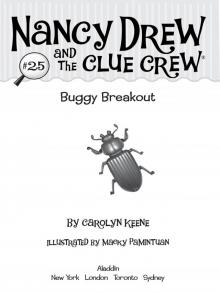 Buggy Breakout
Buggy Breakout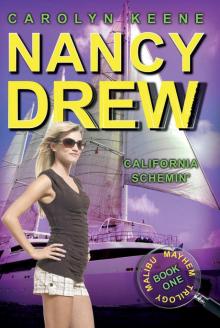 California Schemin'
California Schemin'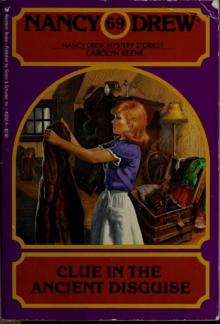 Clue in the Ancient Disguise
Clue in the Ancient Disguise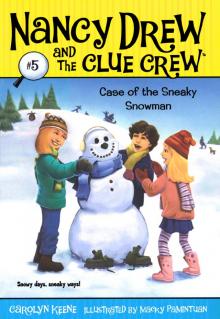 Case of the Sneaky Snowman
Case of the Sneaky Snowman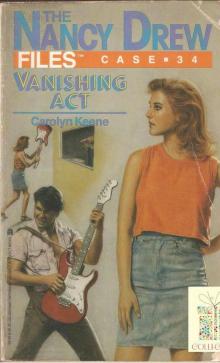 034 Vanishing Act
034 Vanishing Act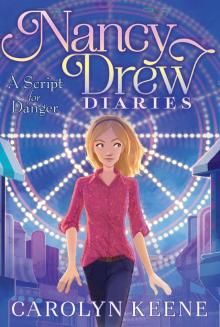 A Script for Danger
A Script for Danger The Flower Show Fiasco
The Flower Show Fiasco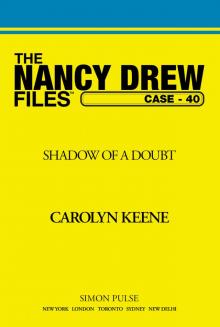 Shadow of a Doubt
Shadow of a Doubt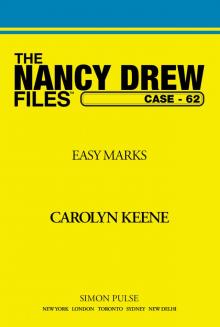 Easy Marks
Easy Marks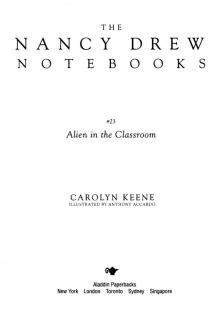 Alien in the Classroom
Alien in the Classroom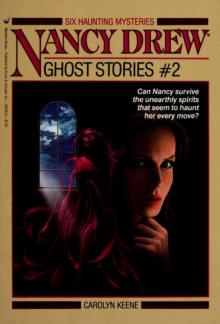 Ghost Stories, #2 (Nancy Drew)
Ghost Stories, #2 (Nancy Drew)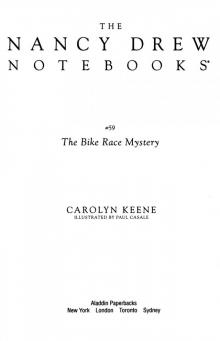 The Bike Race Mystery
The Bike Race Mystery False Pretenses
False Pretenses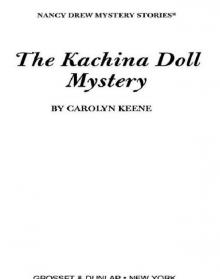 The Kachina Doll Mystery
The Kachina Doll Mystery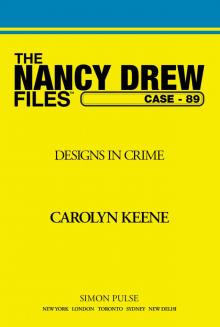 Designs in Crime
Designs in Crime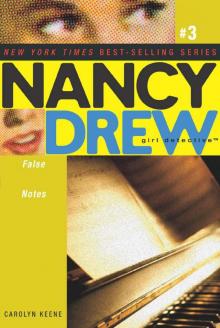 False Notes
False Notes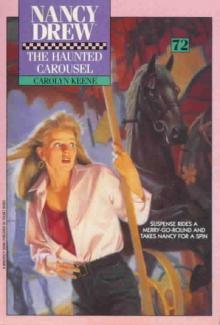 The Haunted Carousel
The Haunted Carousel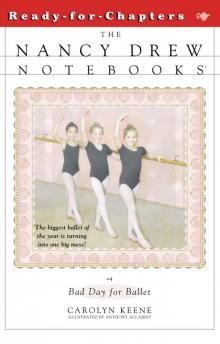 Bad Day for Ballet
Bad Day for Ballet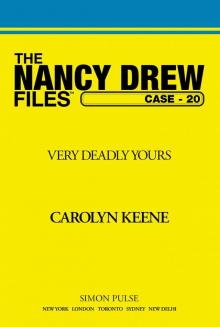 Very Deadly Yours
Very Deadly Yours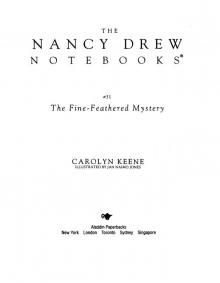 The Fine-Feathered Mystery
The Fine-Feathered Mystery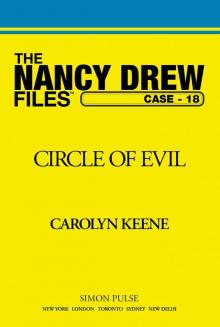 Circle of Evil
Circle of Evil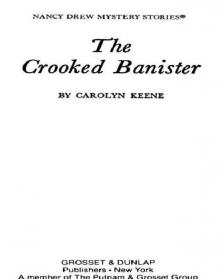 The Crooked Banister
The Crooked Banister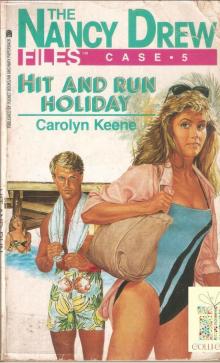 005 Hit and Run Holiday
005 Hit and Run Holiday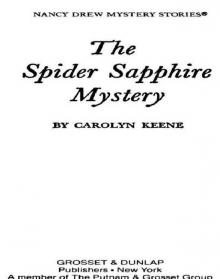 The Spider Sapphire Mystery
The Spider Sapphire Mystery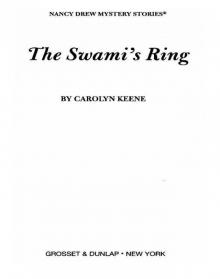 The Swami's Ring
The Swami's Ring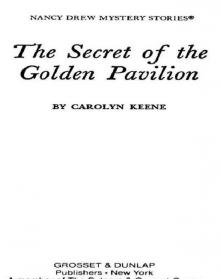 The Secret of the Golden Pavilion
The Secret of the Golden Pavilion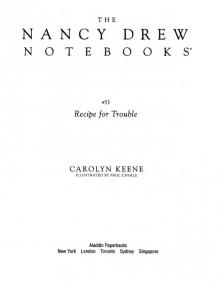 Recipe for Trouble
Recipe for Trouble Betrayed by Love
Betrayed by Love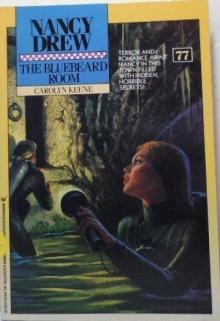 The Bluebeard Room
The Bluebeard Room Sweet Revenge
Sweet Revenge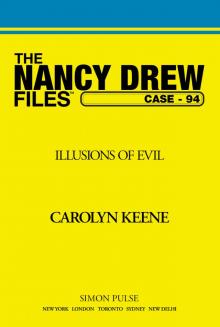 Illusions of Evil
Illusions of Evil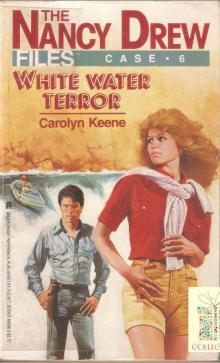 006 White Water Terror
006 White Water Terror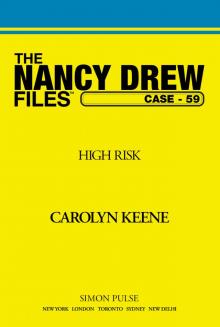 High Risk
High Risk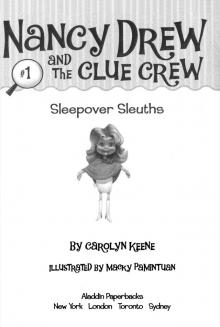 Sleepover Sleuths
Sleepover Sleuths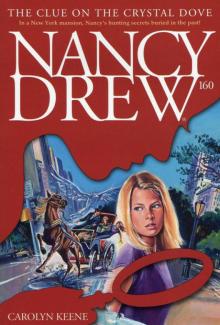 The Clue on the Crystal Dove
The Clue on the Crystal Dove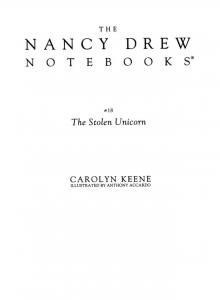 The Stolen Unicorn
The Stolen Unicorn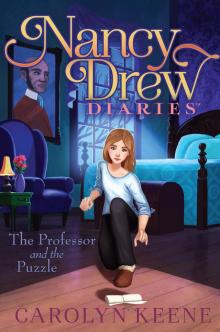 The Professor and the Puzzle
The Professor and the Puzzle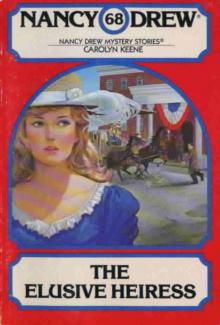 The Elusive Heiress
The Elusive Heiress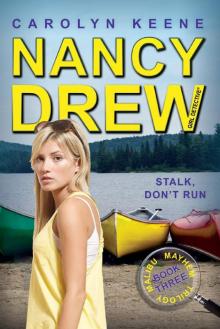 Stalk, Don't Run
Stalk, Don't Run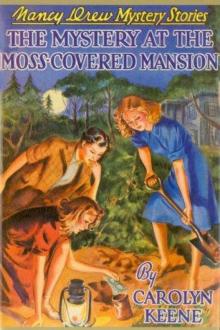 The Mystery at the Moss-Covered Mansion
The Mystery at the Moss-Covered Mansion The Tortoise and the Scare
The Tortoise and the Scare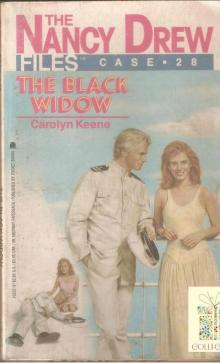 028 The Black Widow
028 The Black Widow Big Worry in Wonderland
Big Worry in Wonderland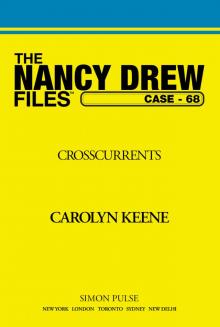 Crosscurrents
Crosscurrents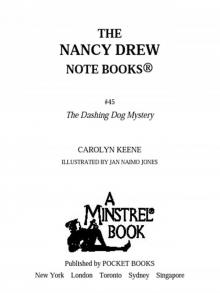 The Dashing Dog Mystery
The Dashing Dog Mystery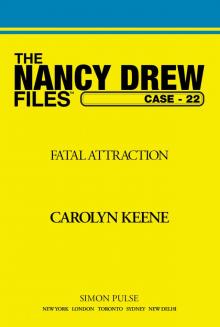 Fatal Attraction
Fatal Attraction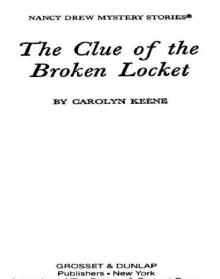 The Clue of the Broken Locket
The Clue of the Broken Locket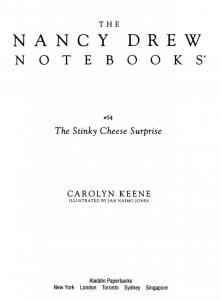 The Stinky Cheese Surprise
The Stinky Cheese Surprise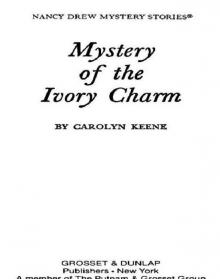 Mystery of the Ivory Charm
Mystery of the Ivory Charm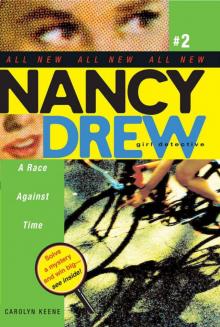 A Race Against Time
A Race Against Time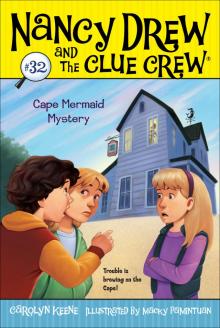 Cape Mermaid Mystery
Cape Mermaid Mystery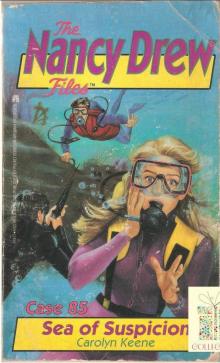 085 Sea of Suspicion
085 Sea of Suspicion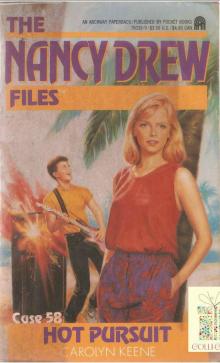 058 Hot Pursuit
058 Hot Pursuit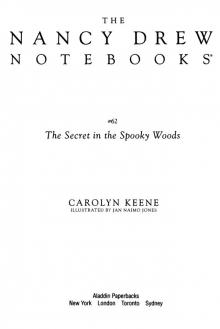 The Secret in the Spooky Woods
The Secret in the Spooky Woods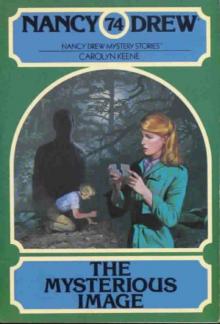 The Mysterious Image
The Mysterious Image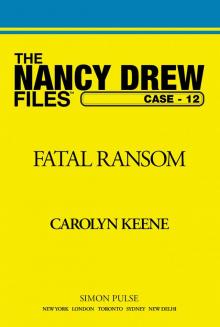 Fatal Ransom
Fatal Ransom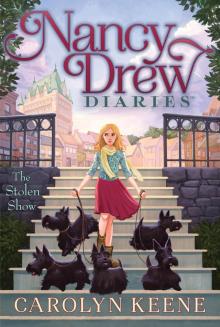 The Stolen Show
The Stolen Show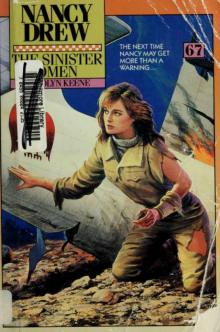 The Sinister Omen
The Sinister Omen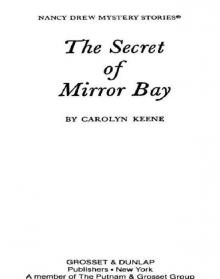 The Secret of Mirror Bay
The Secret of Mirror Bay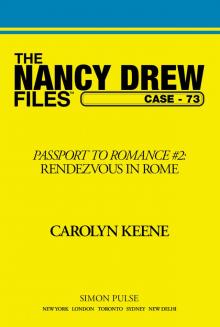 Rendezvous in Rome
Rendezvous in Rome The Perfect Plot
The Perfect Plot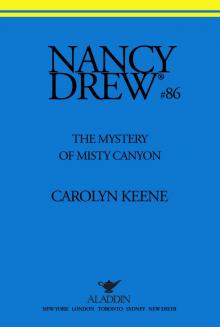 The Mystery of Misty Canyon
The Mystery of Misty Canyon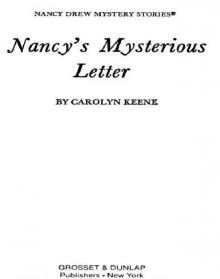 Nancy's Mysterious Letter
Nancy's Mysterious Letter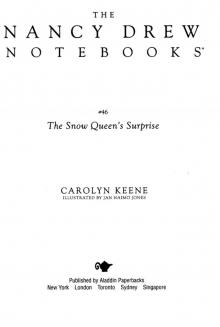 The Snow Queen's Surprise
The Snow Queen's Surprise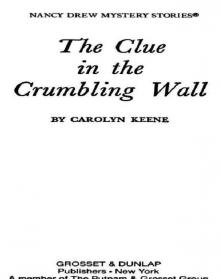 The Clue in the Crumbling Wall
The Clue in the Crumbling Wall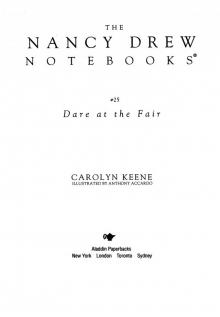 Dare at the Fair
Dare at the Fair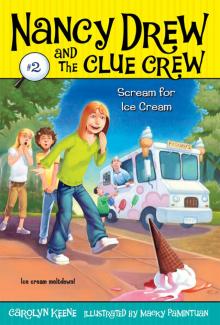 Scream for Ice Cream
Scream for Ice Cream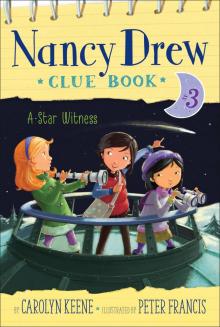 A Star Witness
A Star Witness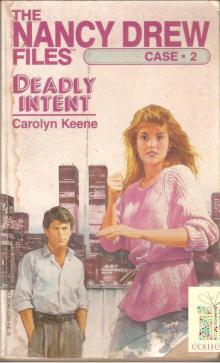 002 Deadly Intent
002 Deadly Intent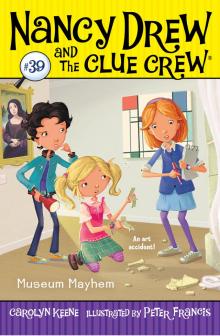 Museum Mayhem
Museum Mayhem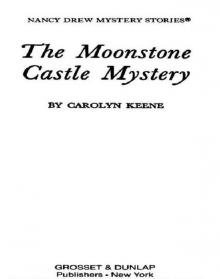 The Moonstone Castle Mystery
The Moonstone Castle Mystery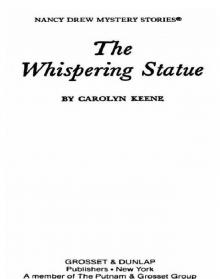 The Whispering Statue
The Whispering Statue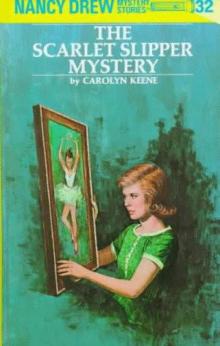 The Scarlet Slipper Mystery
The Scarlet Slipper Mystery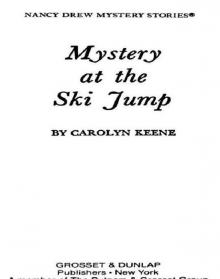 Mystery at the Ski Jump
Mystery at the Ski Jump Hot Pursuit
Hot Pursuit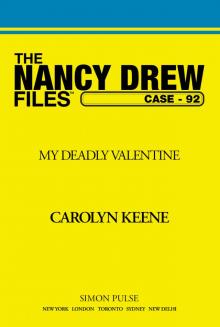 My Deadly Valentine
My Deadly Valentine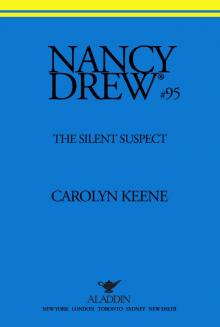 The Silent Suspect
The Silent Suspect Deep Secrets
Deep Secrets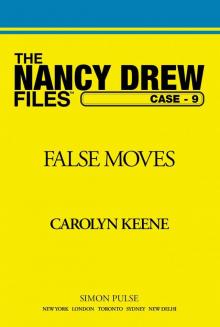 False Moves
False Moves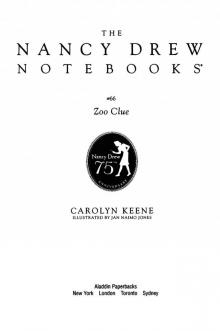 The Zoo Crew
The Zoo Crew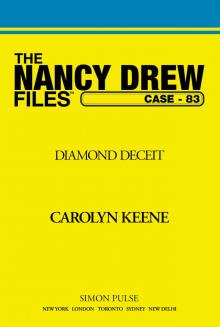 Diamond Deceit
Diamond Deceit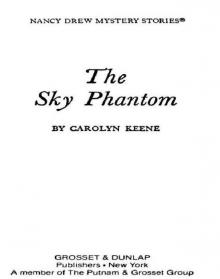 The Sky Phantom
The Sky Phantom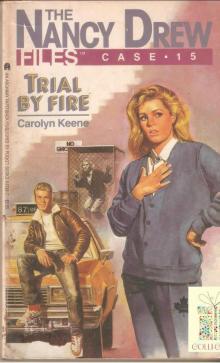 015 Trial by Fire
015 Trial by Fire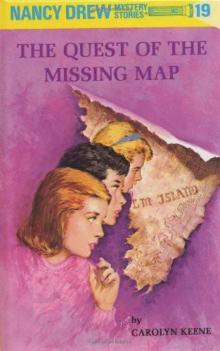 The Quest of the Missing Map
The Quest of the Missing Map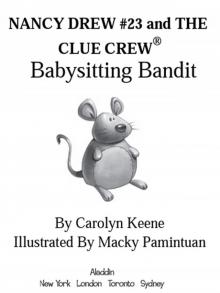 Babysitting Bandit
Babysitting Bandit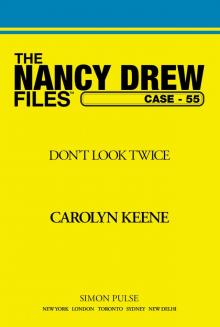 Don't Look Twice
Don't Look Twice Never Say Die
Never Say Die The Soccer Shoe Clue
The Soccer Shoe Clue Pool Party Puzzler
Pool Party Puzzler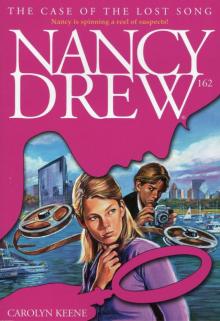 The Case of the Lost Song
The Case of the Lost Song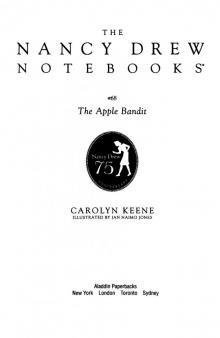 The Apple Bandit
The Apple Bandit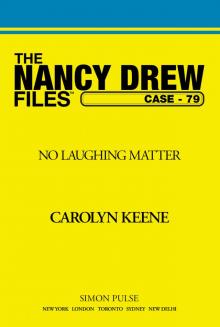 No Laughing Matter
No Laughing Matter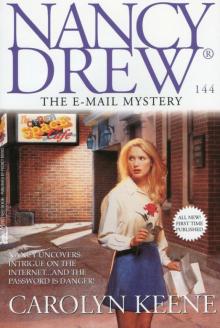 The Thirteenth Pearl
The Thirteenth Pearl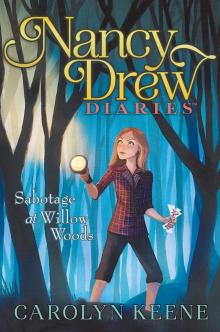 Sabotage at Willow Woods
Sabotage at Willow Woods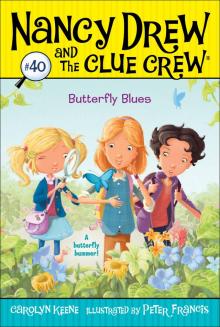 Butterfly Blues
Butterfly Blues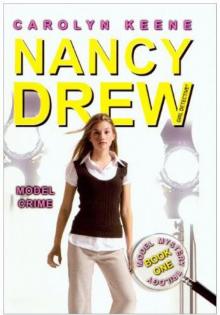 Model Crime 1
Model Crime 1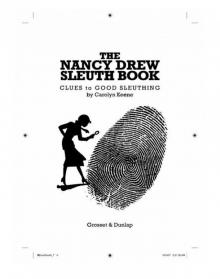 The Nancy Drew Sleuth Book
The Nancy Drew Sleuth Book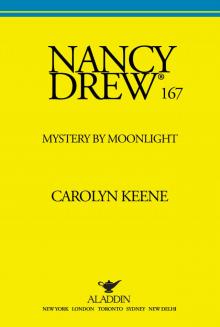 Mystery by Moonlight
Mystery by Moonlight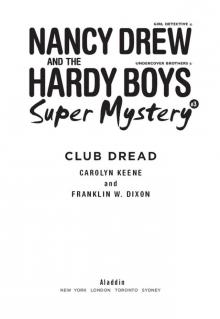 Club Dread
Club Dread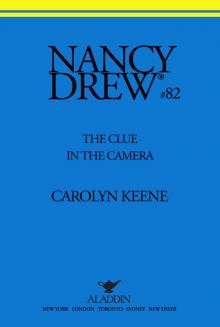 The Clue in the Camera
The Clue in the Camera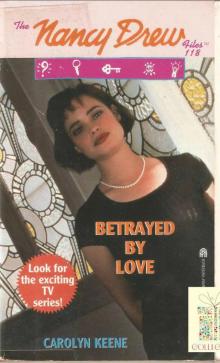 118 Betrayed By Love
118 Betrayed By Love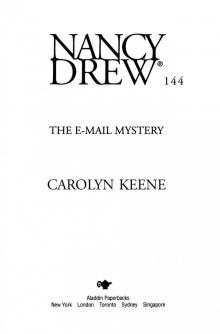 The E-Mail Mystery (Nancy Drew Book 144)
The E-Mail Mystery (Nancy Drew Book 144)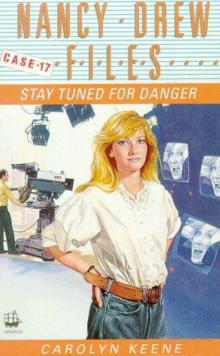 Stay Tuned for Danger: Circle of Evil
Stay Tuned for Danger: Circle of Evil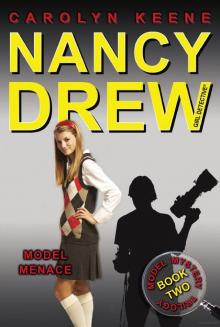 Model Menace 2
Model Menace 2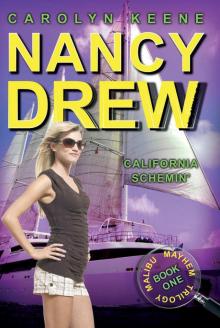 California Schemin': Book One in the Malibu Mayhem Trilogy
California Schemin': Book One in the Malibu Mayhem Trilogy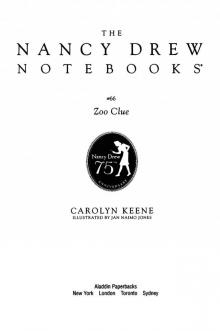 Zoo Clue (Nancy Drew Notebooks)
Zoo Clue (Nancy Drew Notebooks)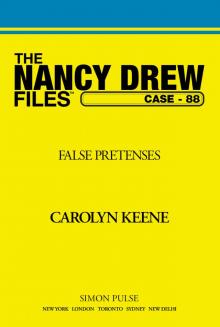 False Pretences
False Pretences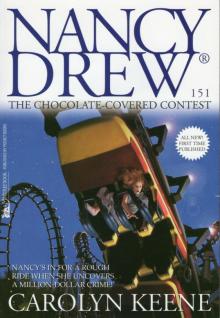 151 The Chocolate-Covered Contest
151 The Chocolate-Covered Contest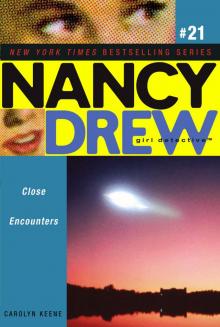 Close Encounters
Close Encounters The Emeral-Eyed Cat Mystery
The Emeral-Eyed Cat Mystery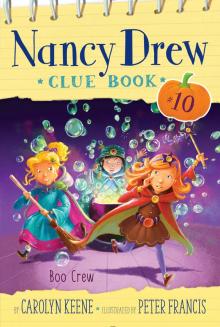 Boo Crew
Boo Crew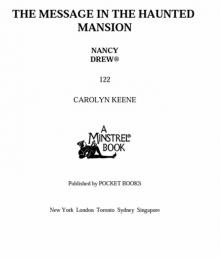 The Message in the Haunted Mansion (Nancy Drew Book 122)
The Message in the Haunted Mansion (Nancy Drew Book 122)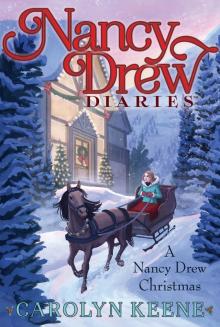 A Nancy Drew Christmas
A Nancy Drew Christmas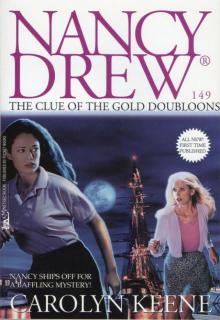 149 The Clue Of The Gold Doubloons
149 The Clue Of The Gold Doubloons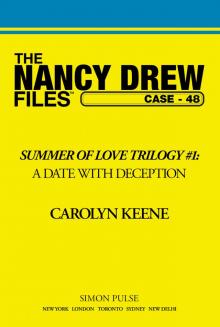 A Date with Deception
A Date with Deception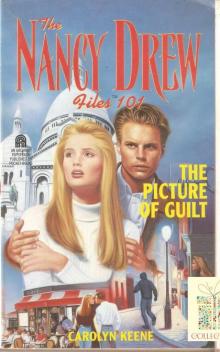 101 The Picture of Guilt
101 The Picture of Guilt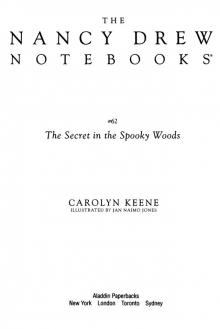 The Secret in the Spooky Woods (Nancy Drew Notebooks Book 62)
The Secret in the Spooky Woods (Nancy Drew Notebooks Book 62)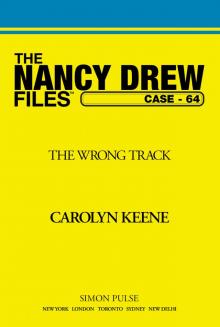 The Wrong Track
The Wrong Track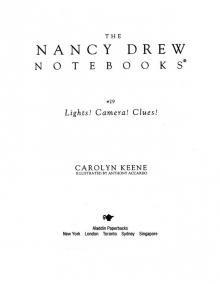 Lights! Camera! Clues!
Lights! Camera! Clues!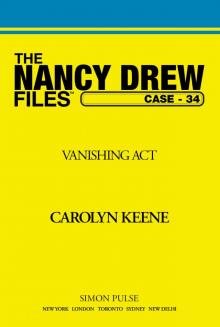 The Vanishing Act
The Vanishing Act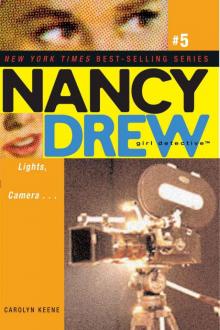 Lights, Camera . . .
Lights, Camera . . .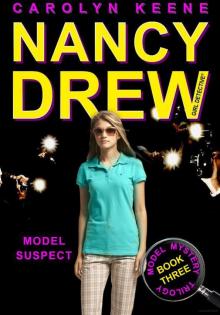 Model Suspect 3
Model Suspect 3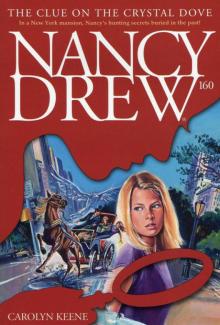 160 The Clue On The Crystal Dove
160 The Clue On The Crystal Dove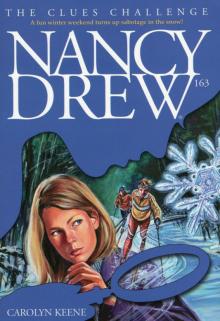 163 The Clues Challenge
163 The Clues Challenge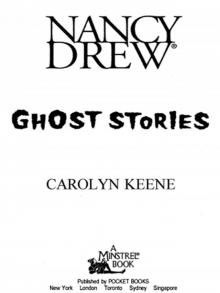 Ghost Stories (Nancy Drew)
Ghost Stories (Nancy Drew) Space Case (Nancy Drew Notebooks Book 61)
Space Case (Nancy Drew Notebooks Book 61)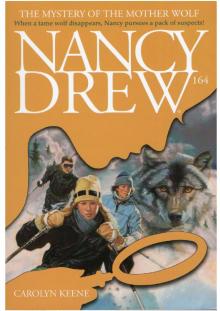 164 The Mystery Of The Mother Wolf
164 The Mystery Of The Mother Wolf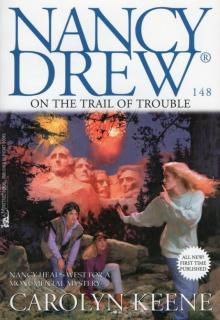 148 On The Trail Of Trouble
148 On The Trail Of Trouble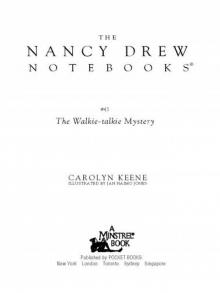 The Walkie-Talkie Mystery
The Walkie-Talkie Mystery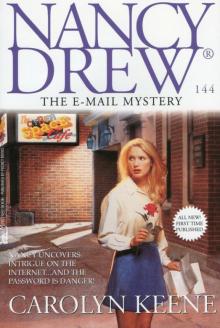 The E-Mail Mystery
The E-Mail Mystery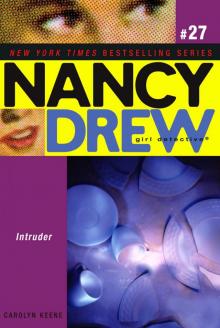 Intruder (Nancy Drew (All New) Girl Detective)
Intruder (Nancy Drew (All New) Girl Detective)![The Stolen Relic [Nancy Drew Girl Detective 007] Read online](http://i1.bookreadfree.com/i2/04/11/the_stolen_relic_nancy_drew_girl_detective_007_preview.jpg) The Stolen Relic [Nancy Drew Girl Detective 007]
The Stolen Relic [Nancy Drew Girl Detective 007]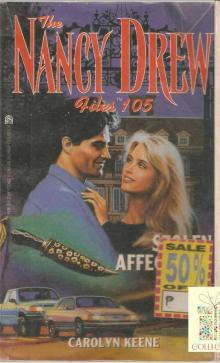 105 Stolen Affections
105 Stolen Affections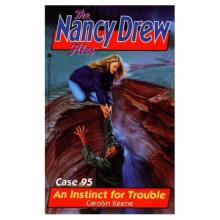 An Instict for Trouble
An Instict for Trouble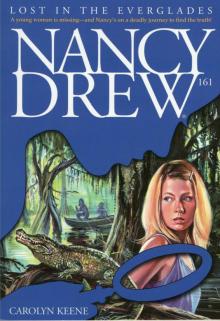 161 Lost In The Everglades
161 Lost In The Everglades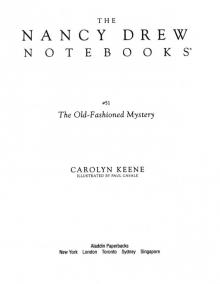 The Old-Fashioned Mystery
The Old-Fashioned Mystery Perfect Plot
Perfect Plot